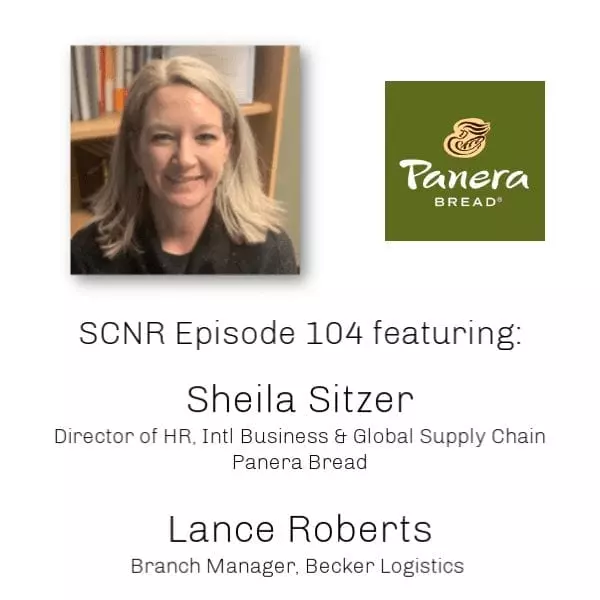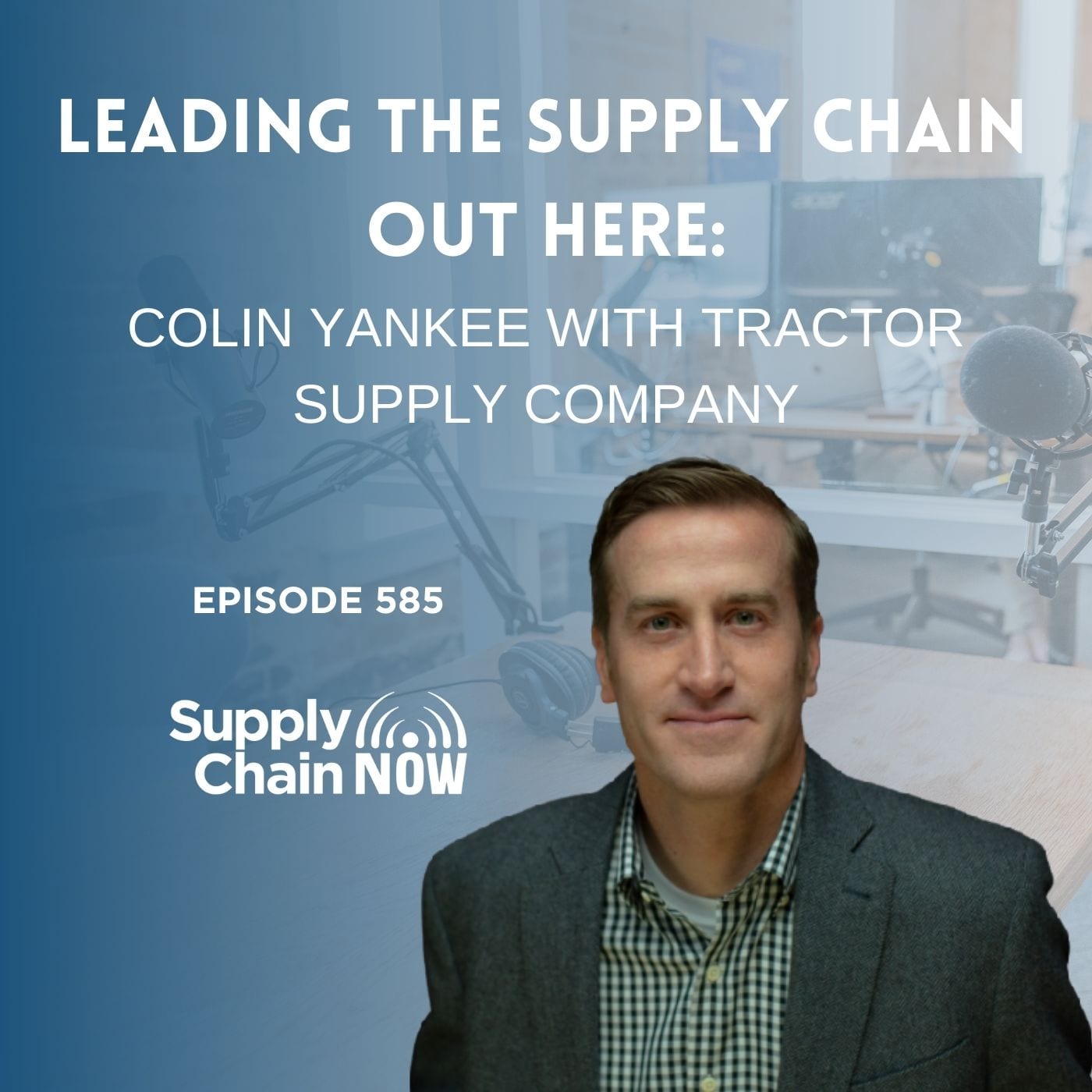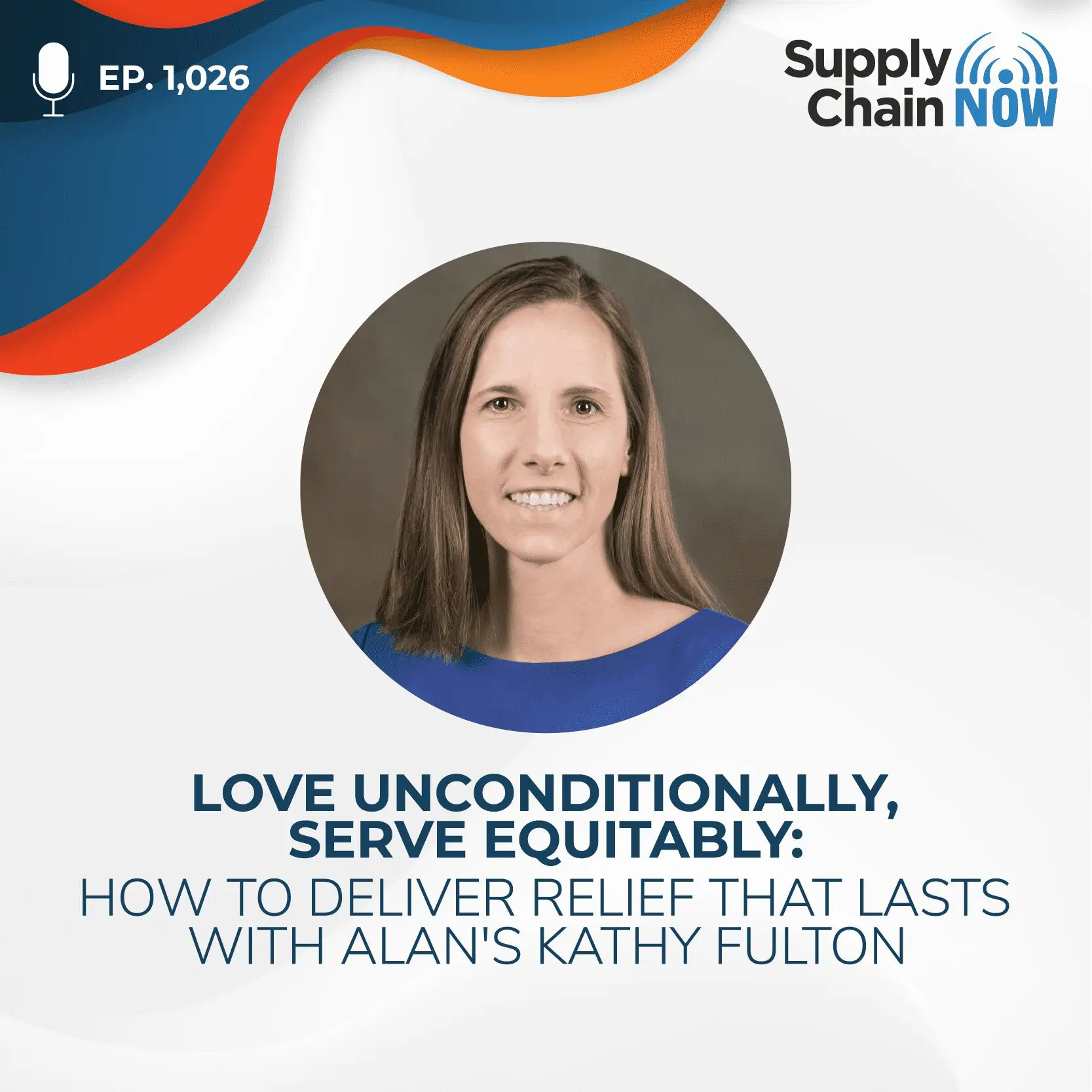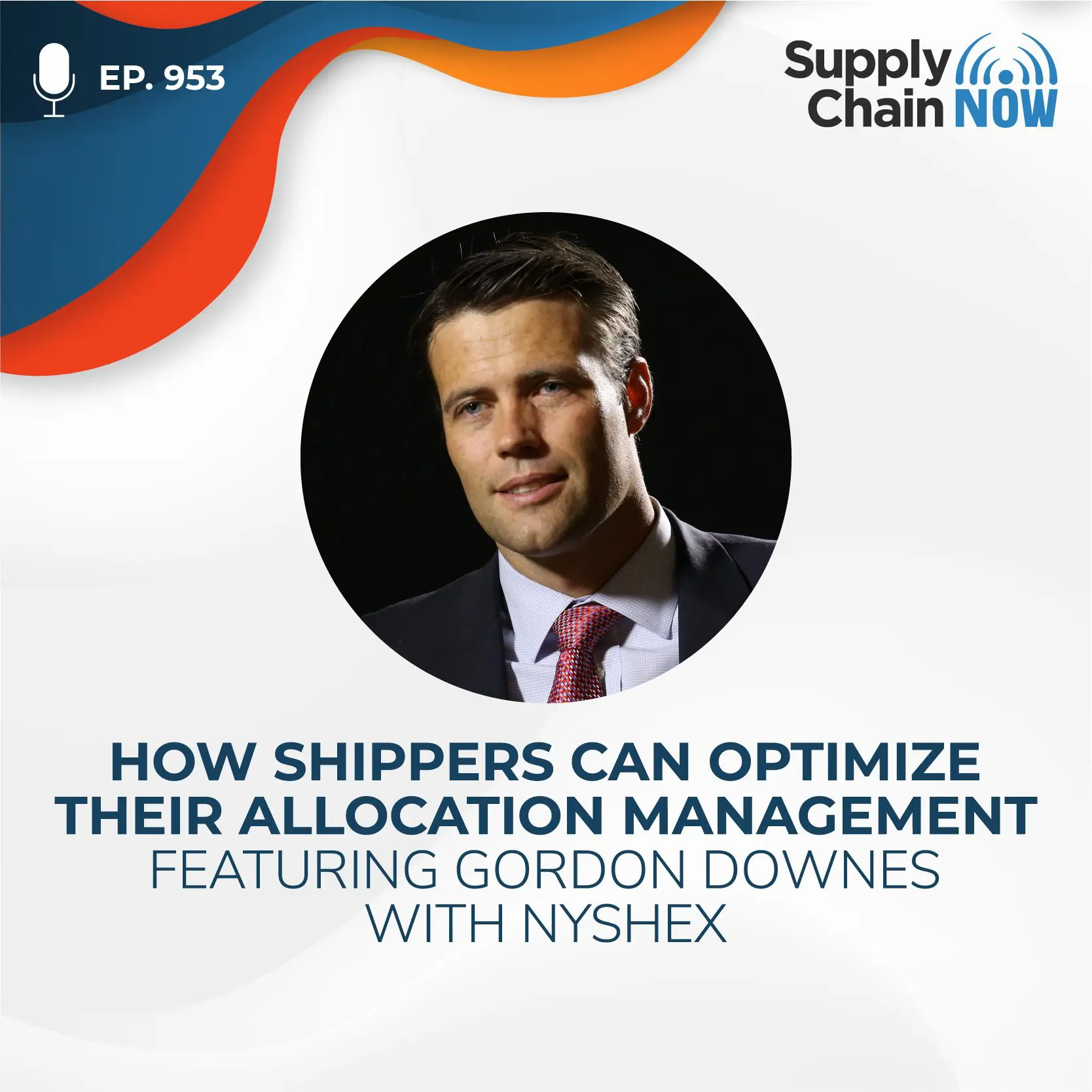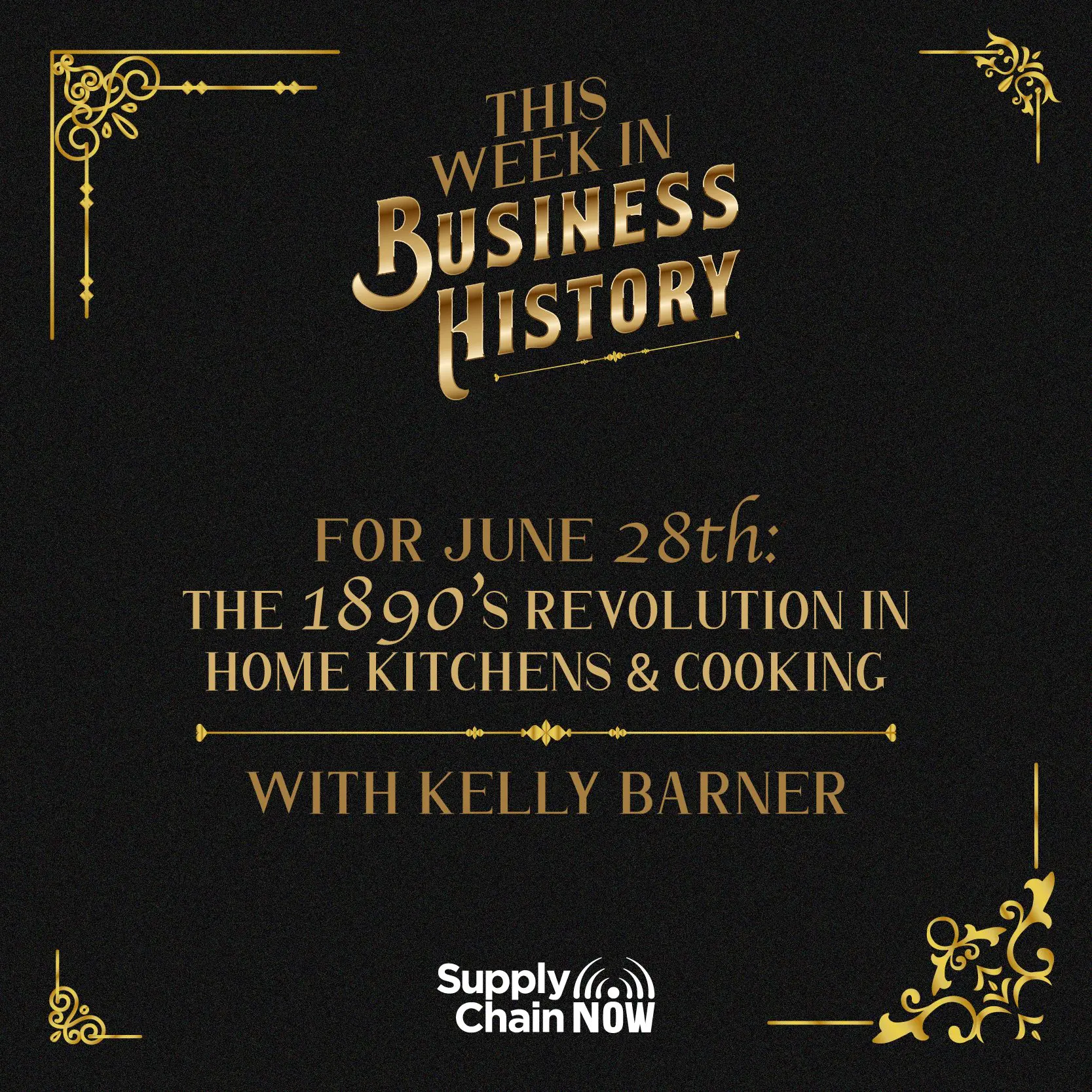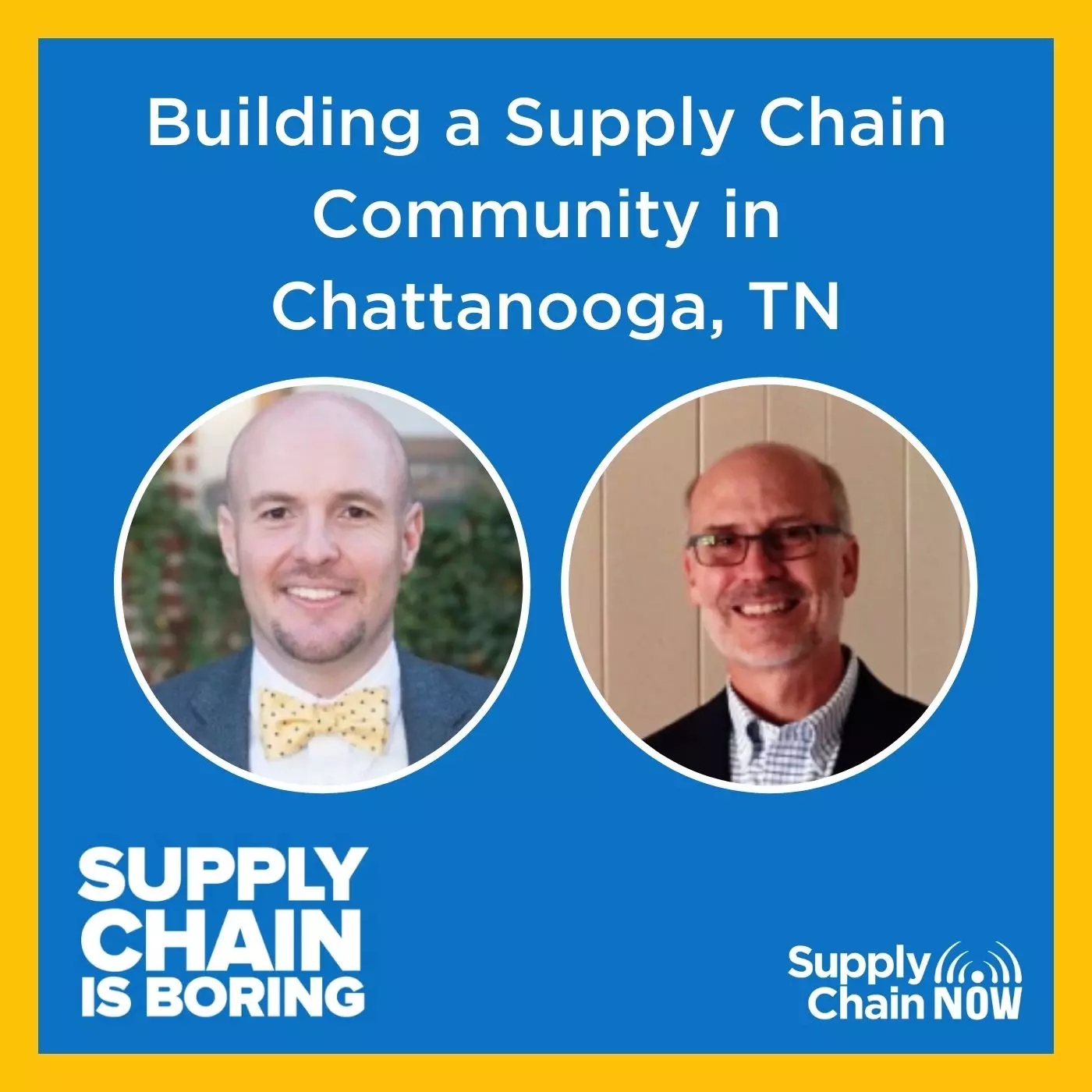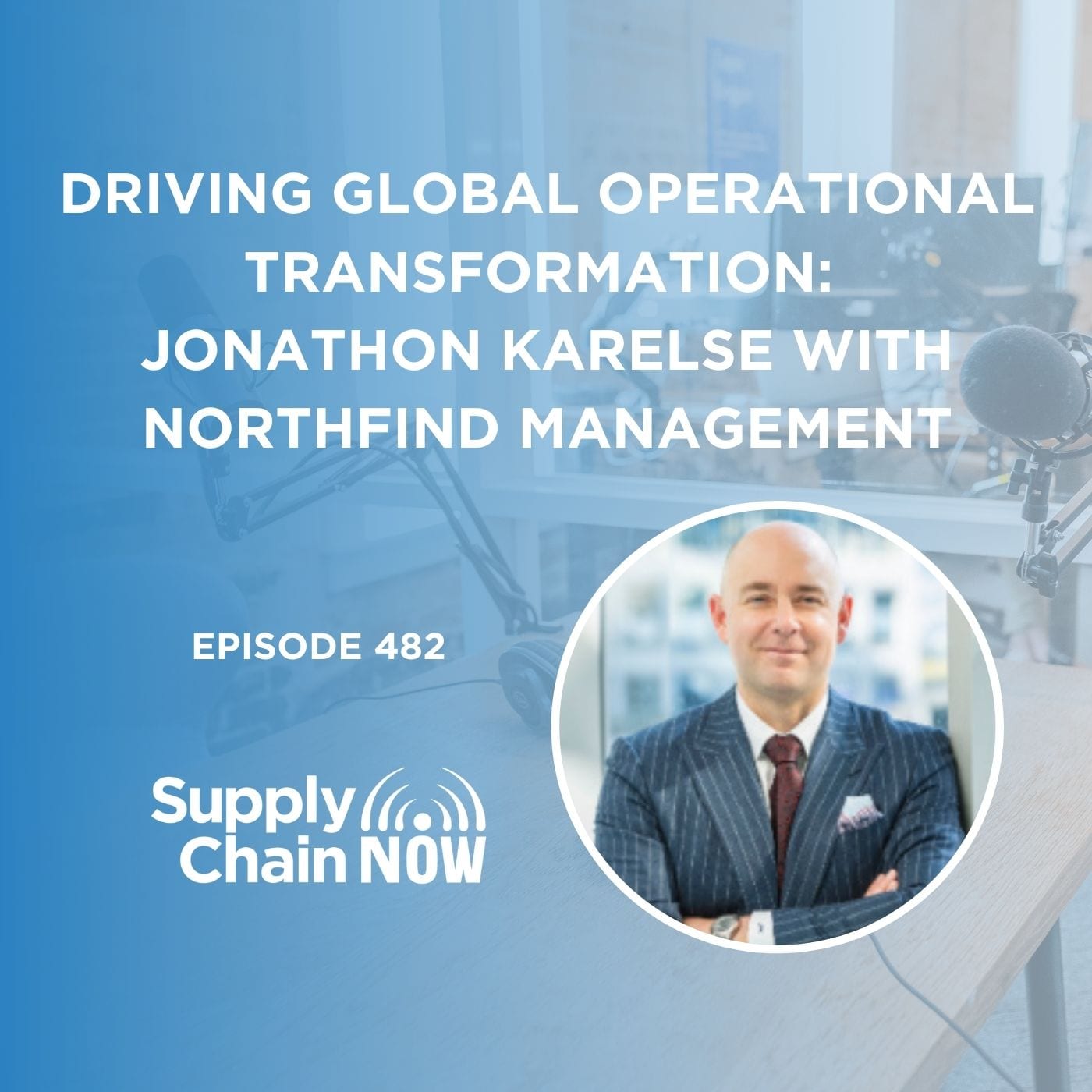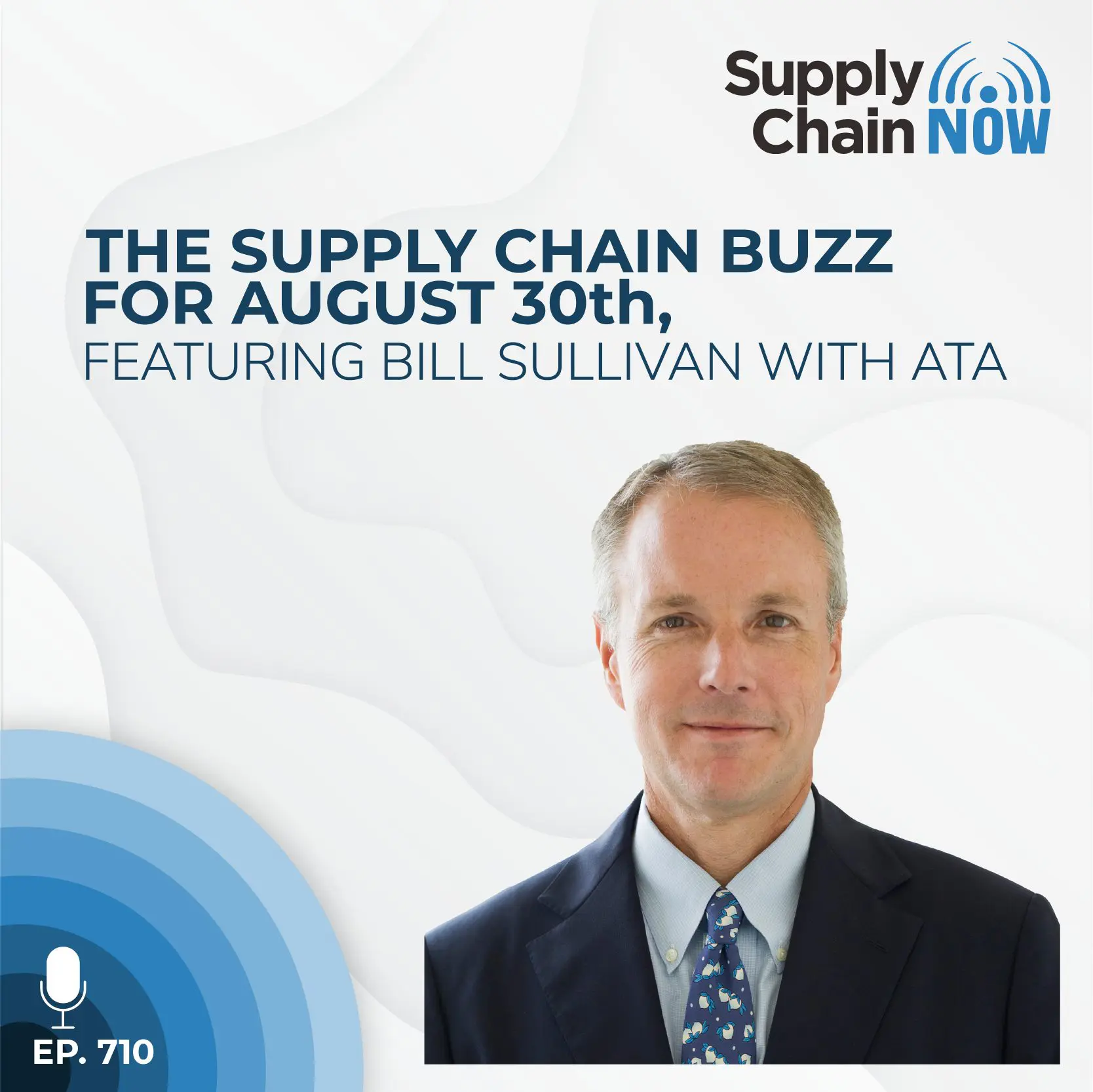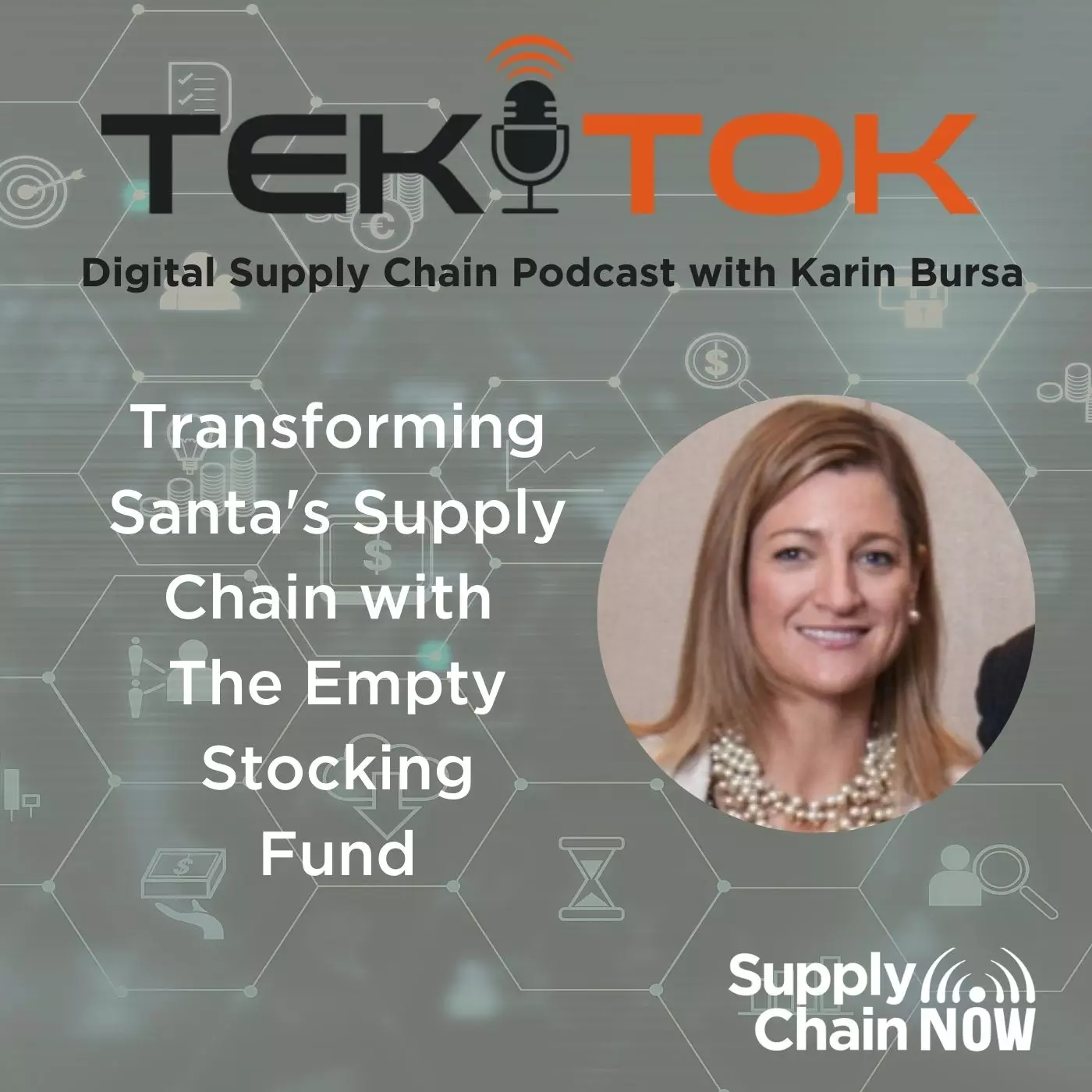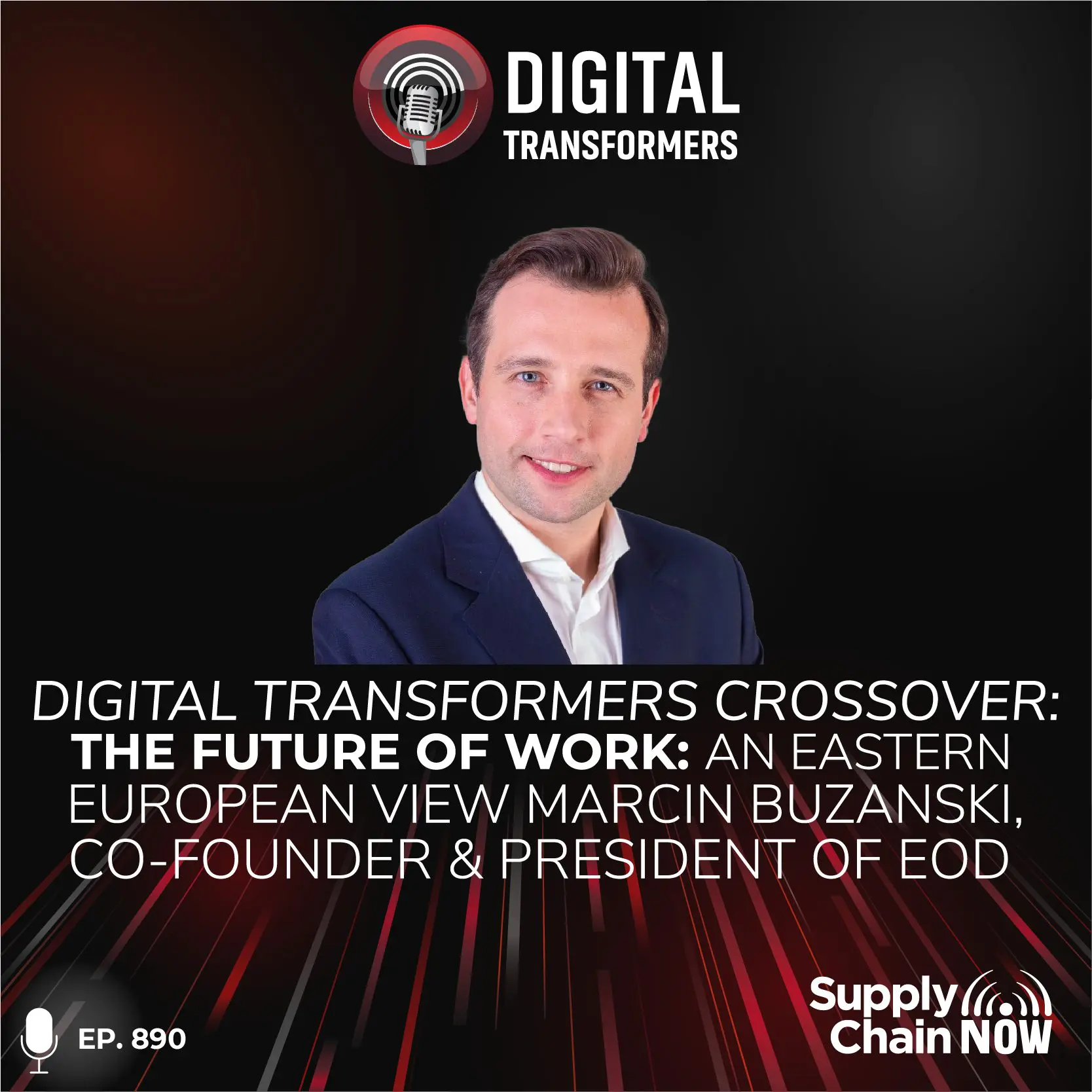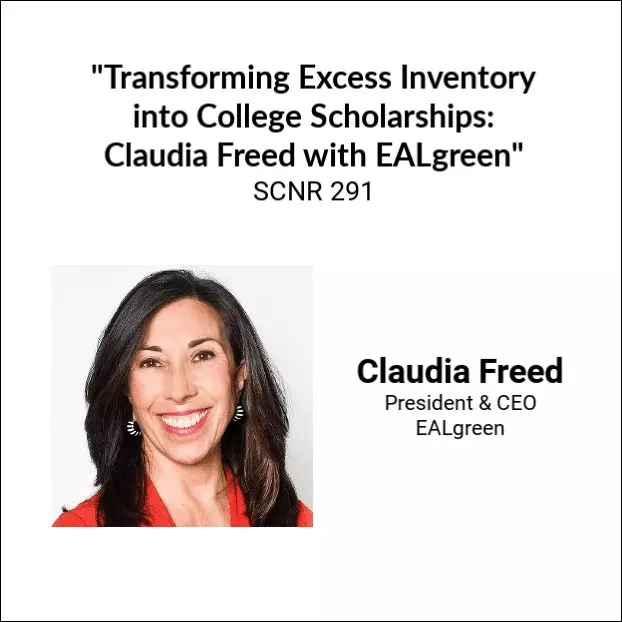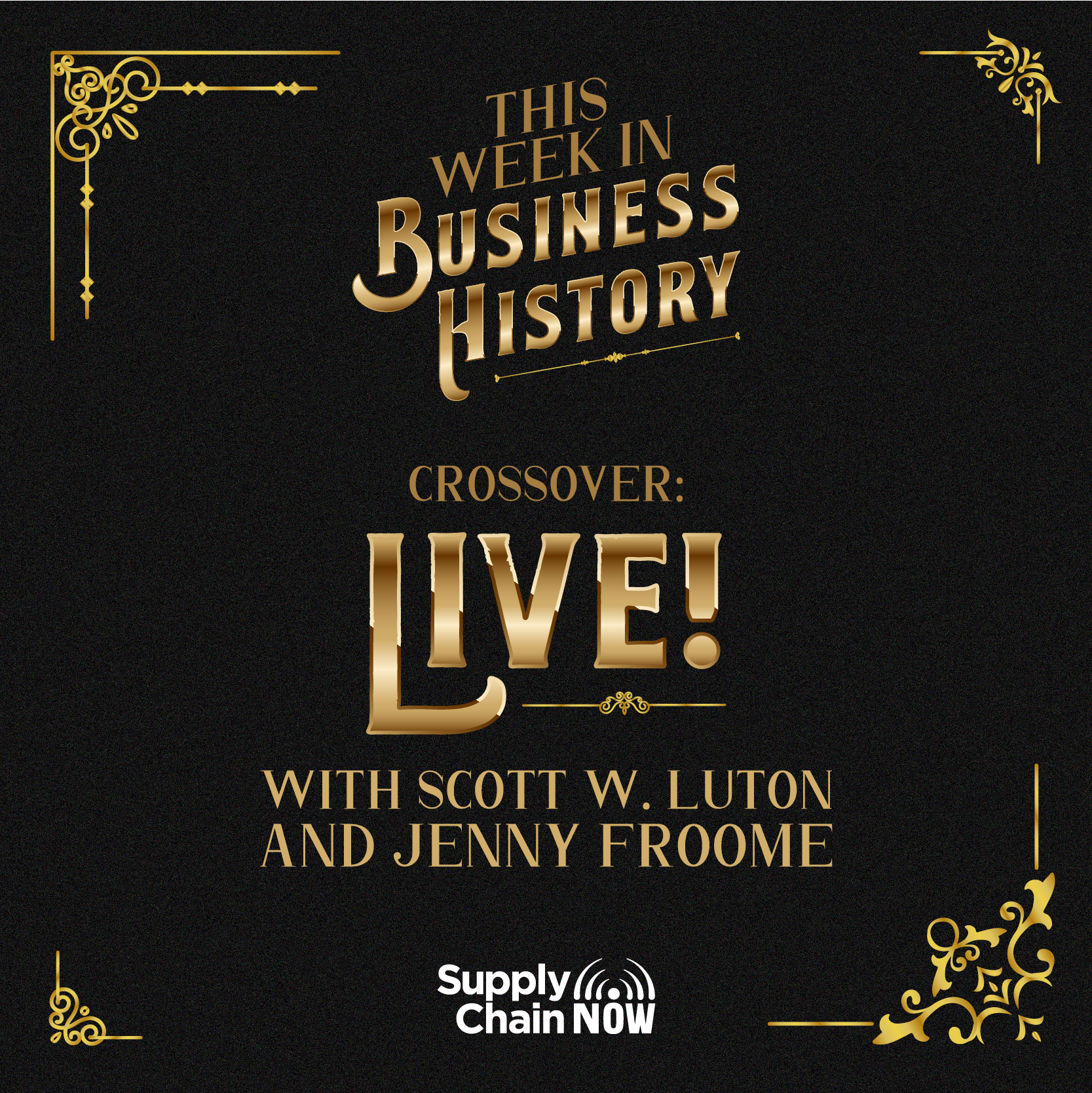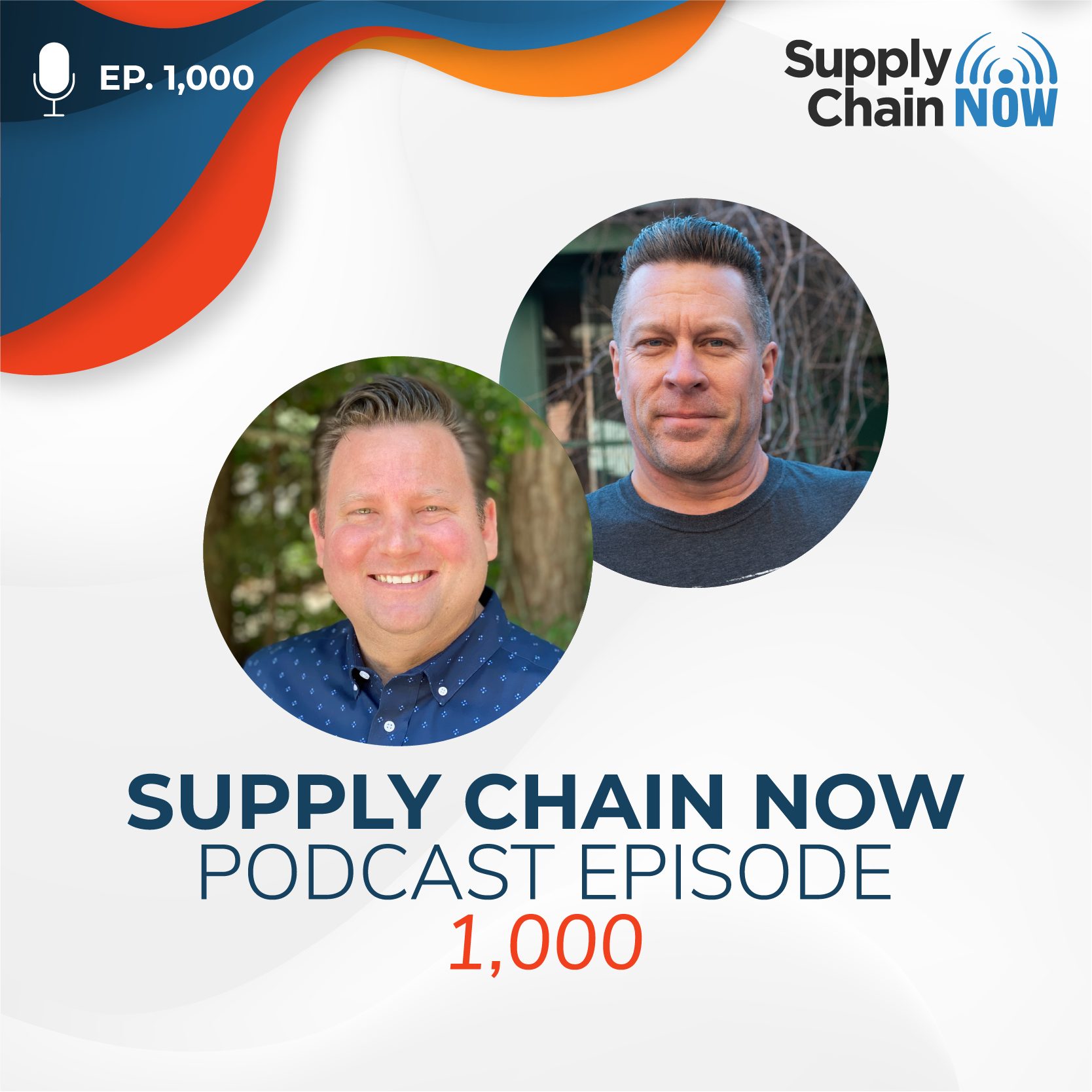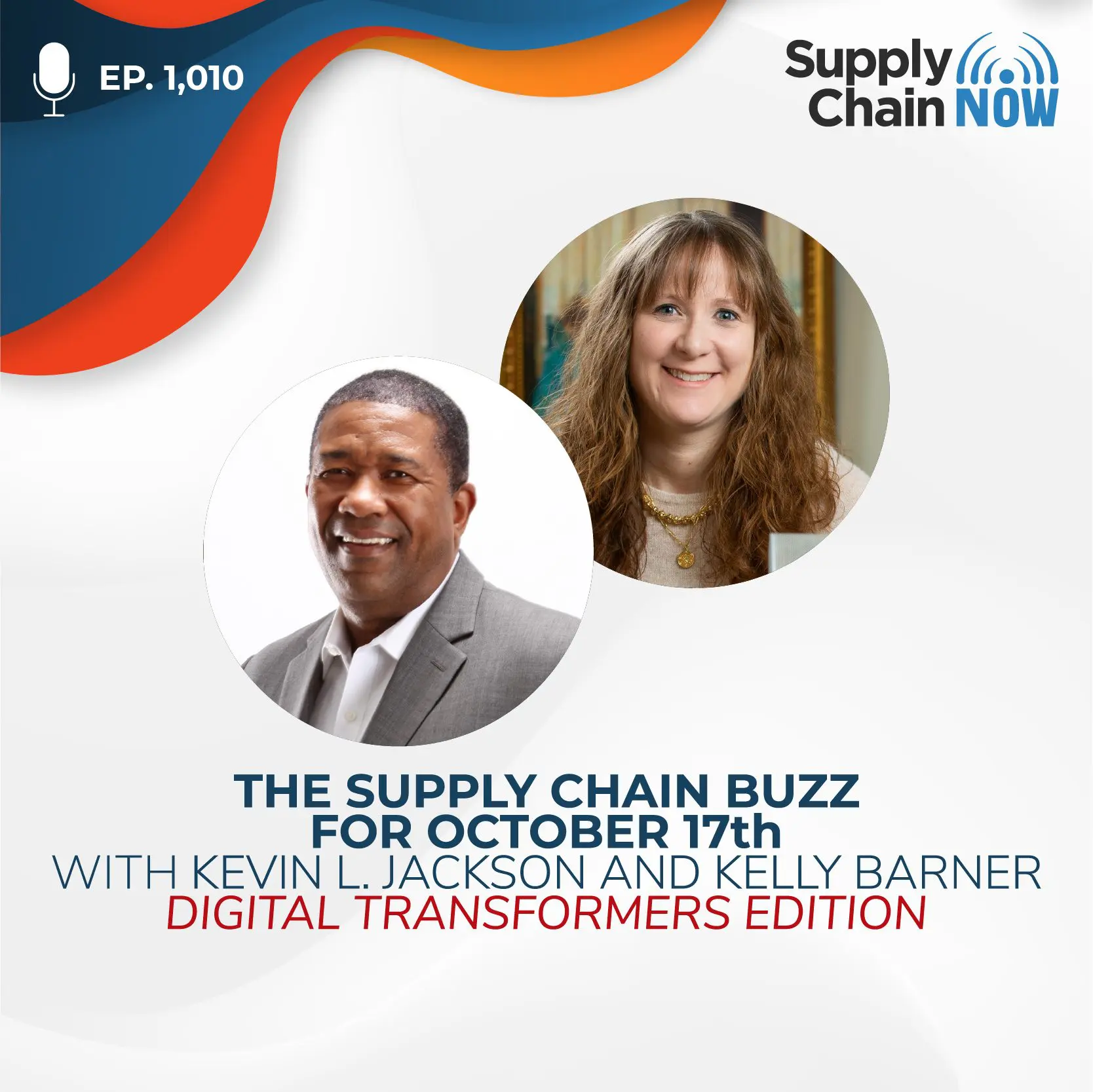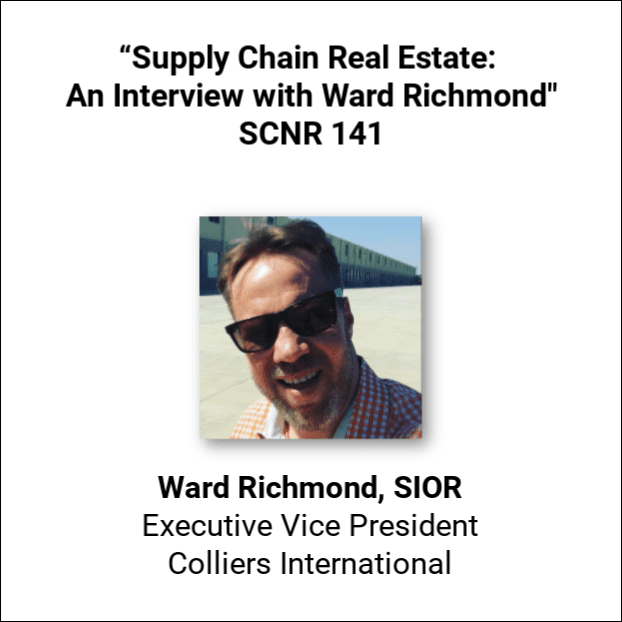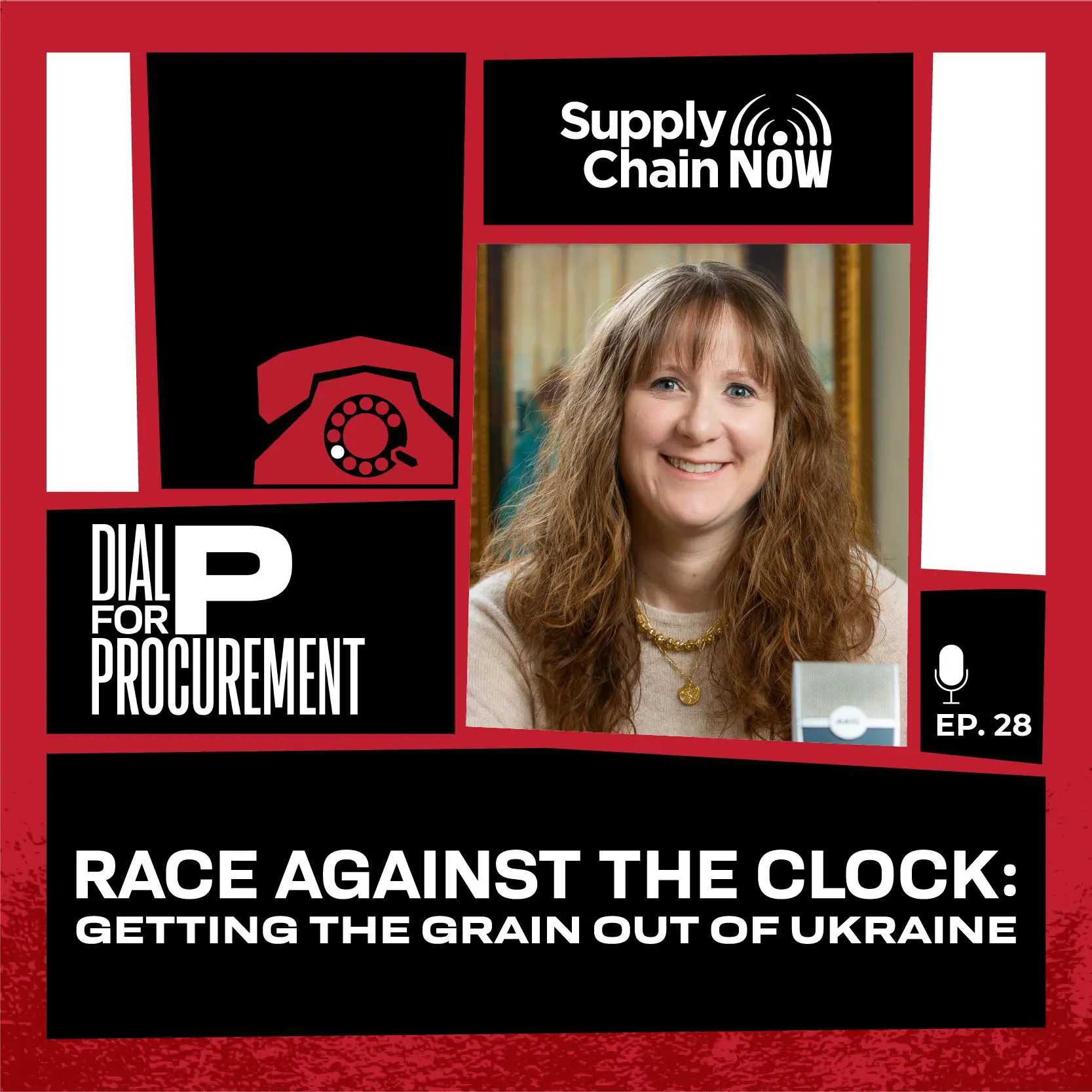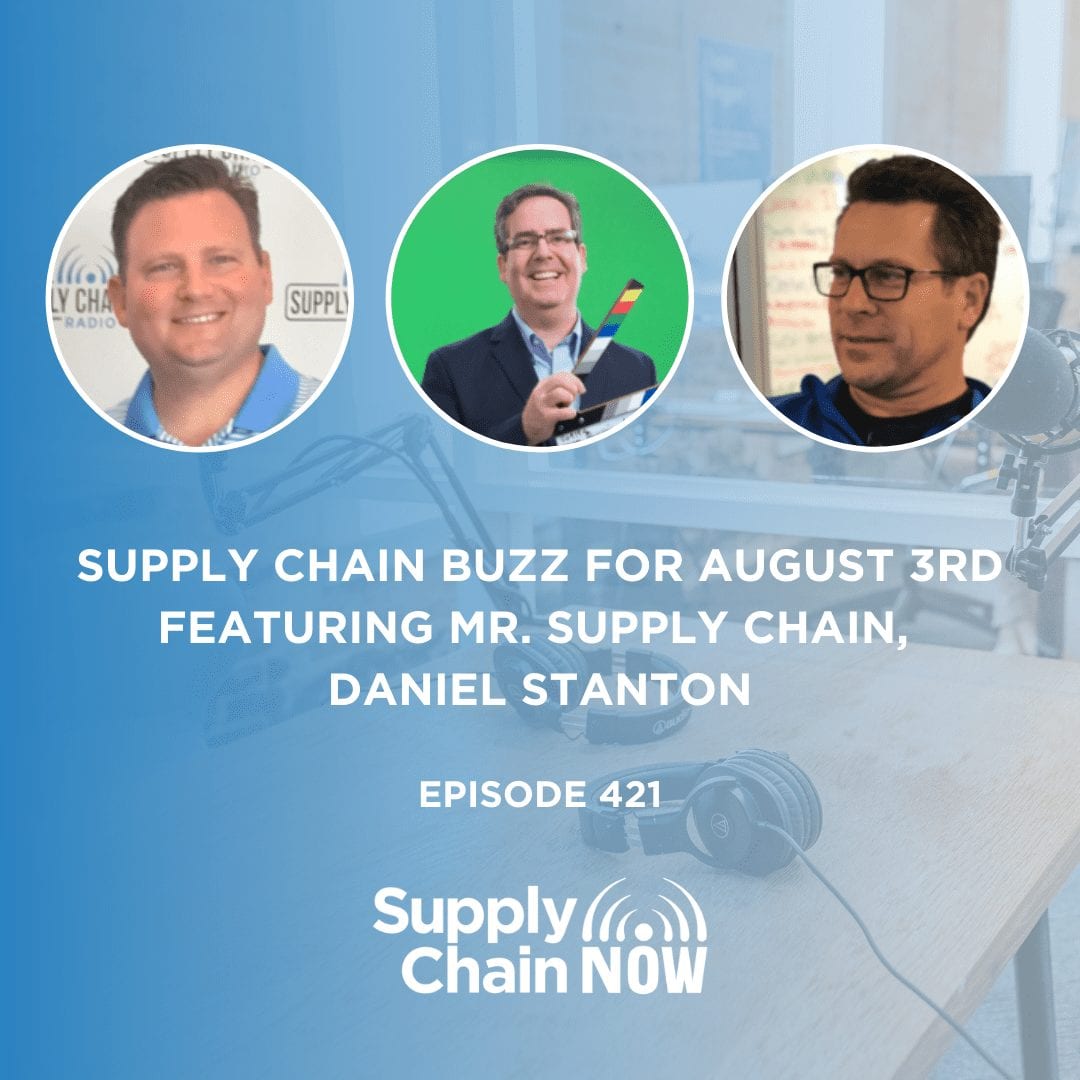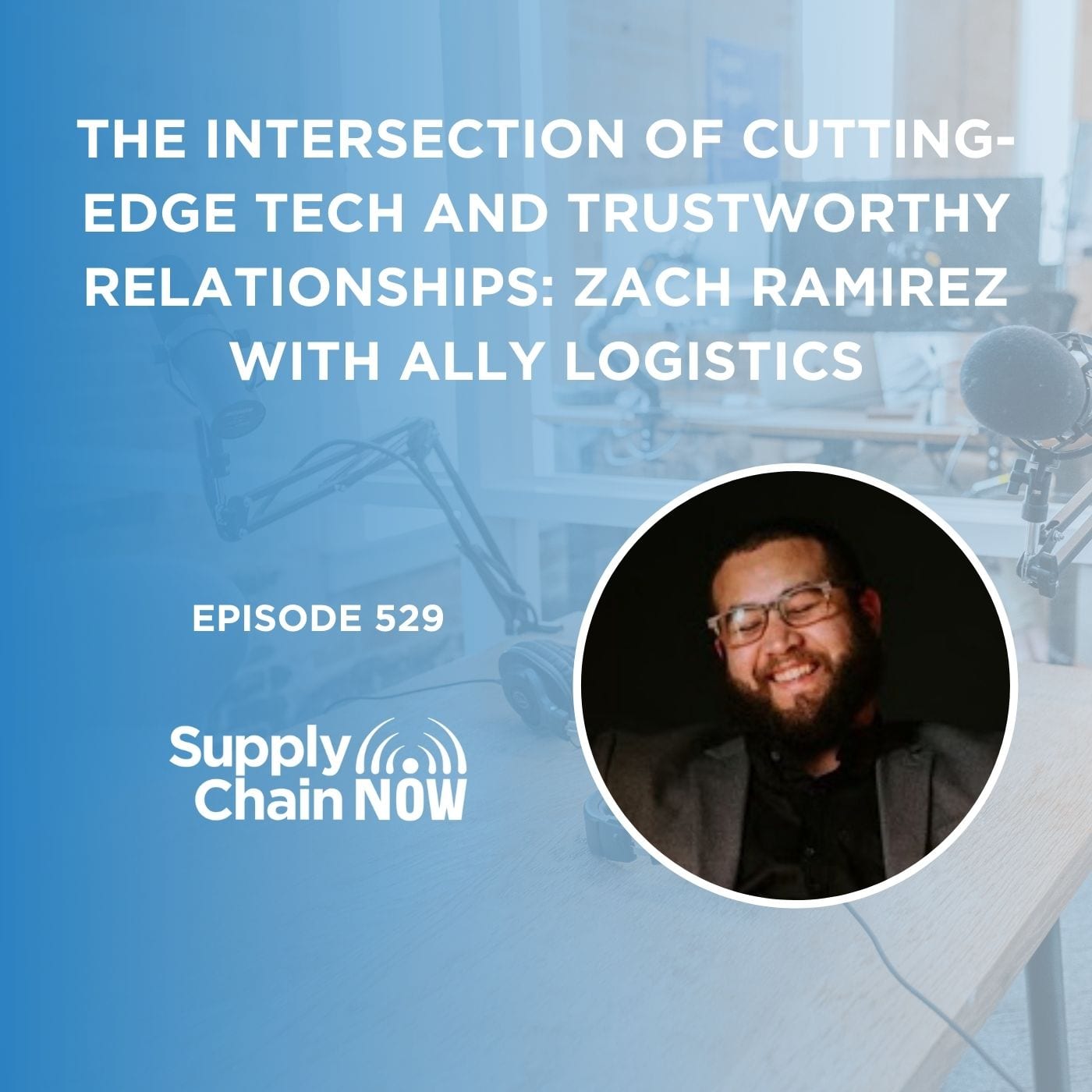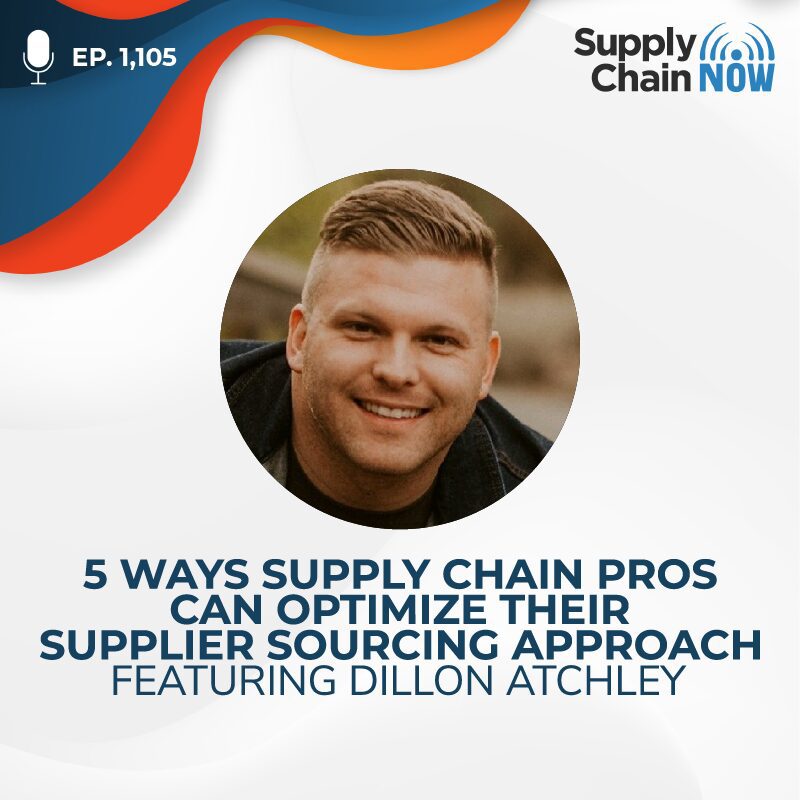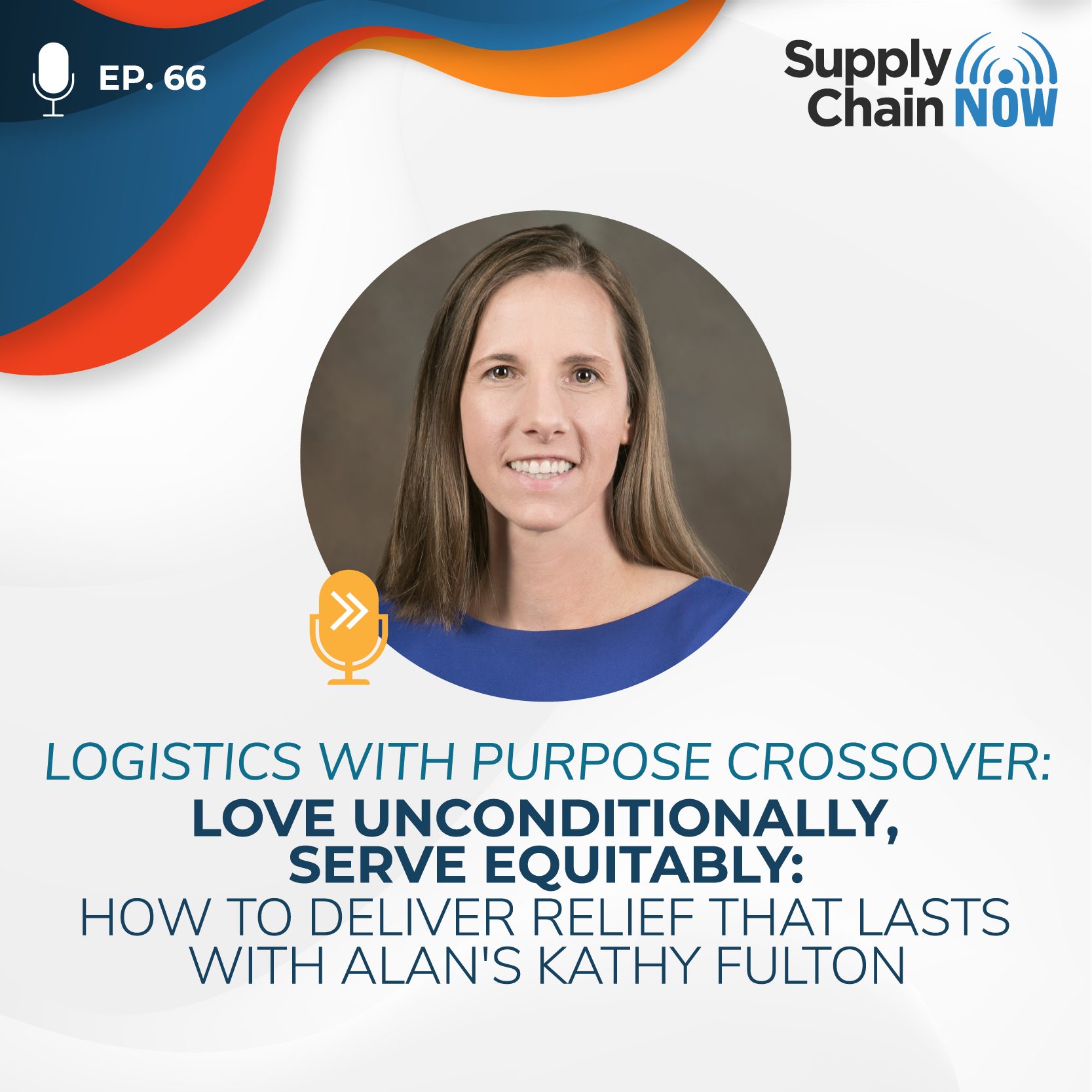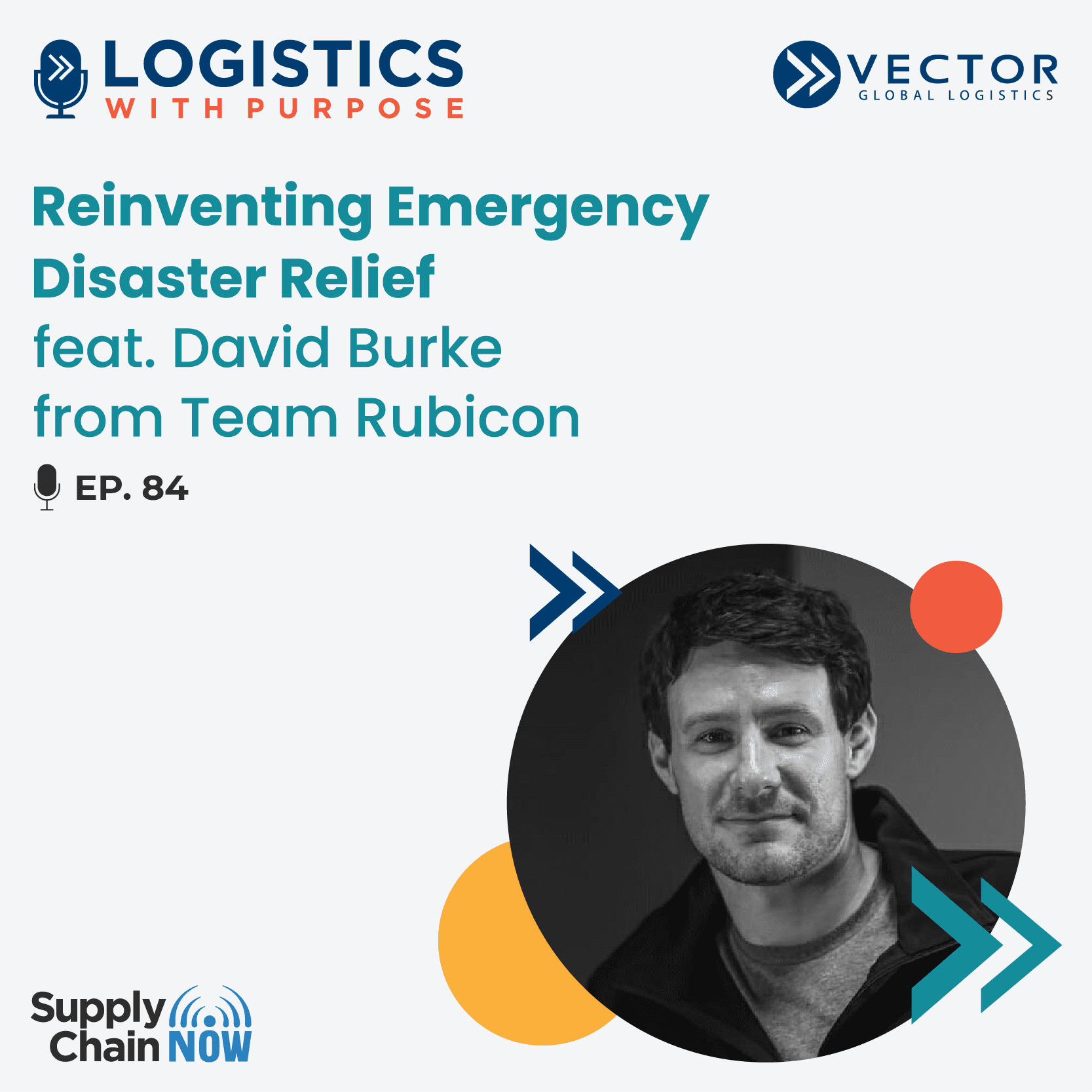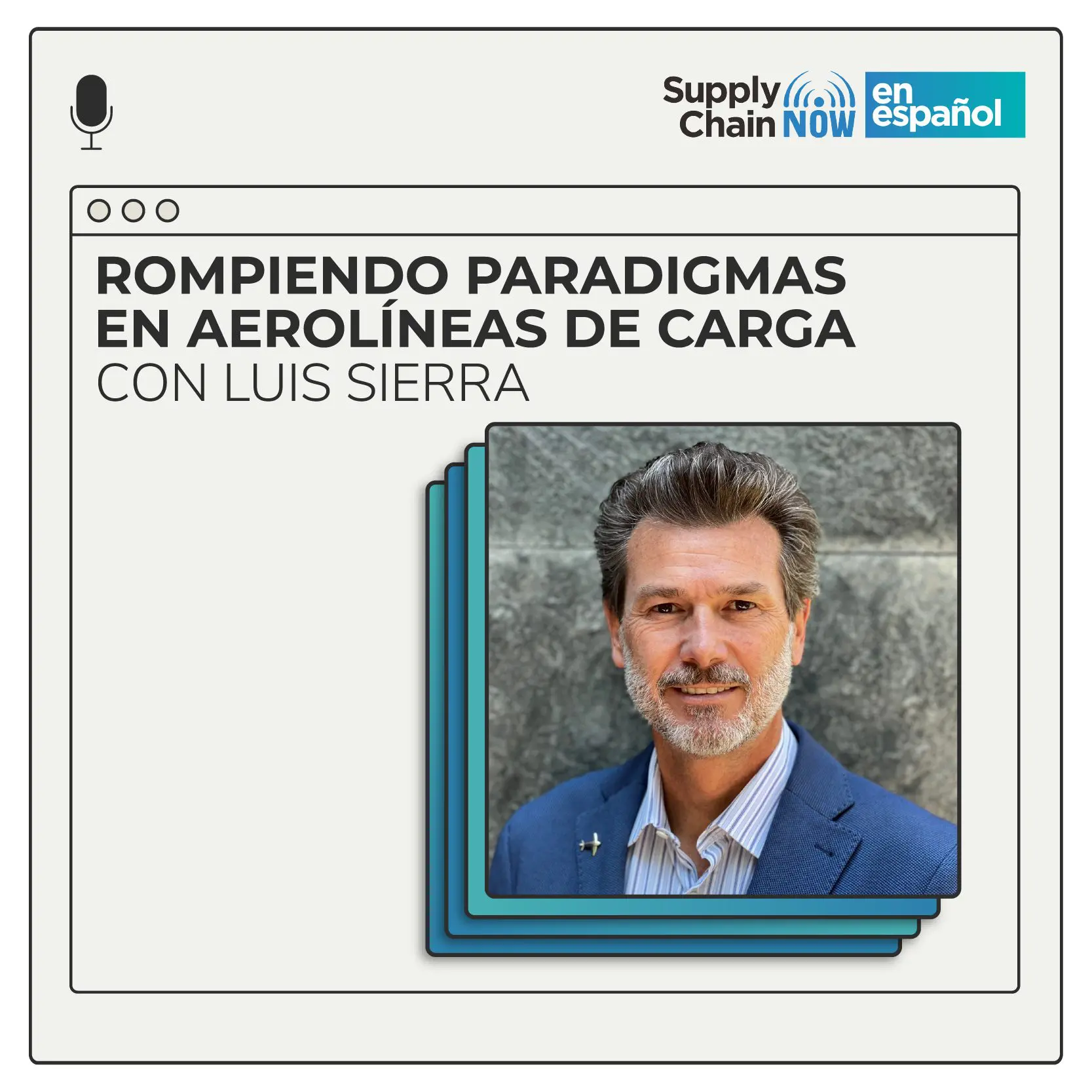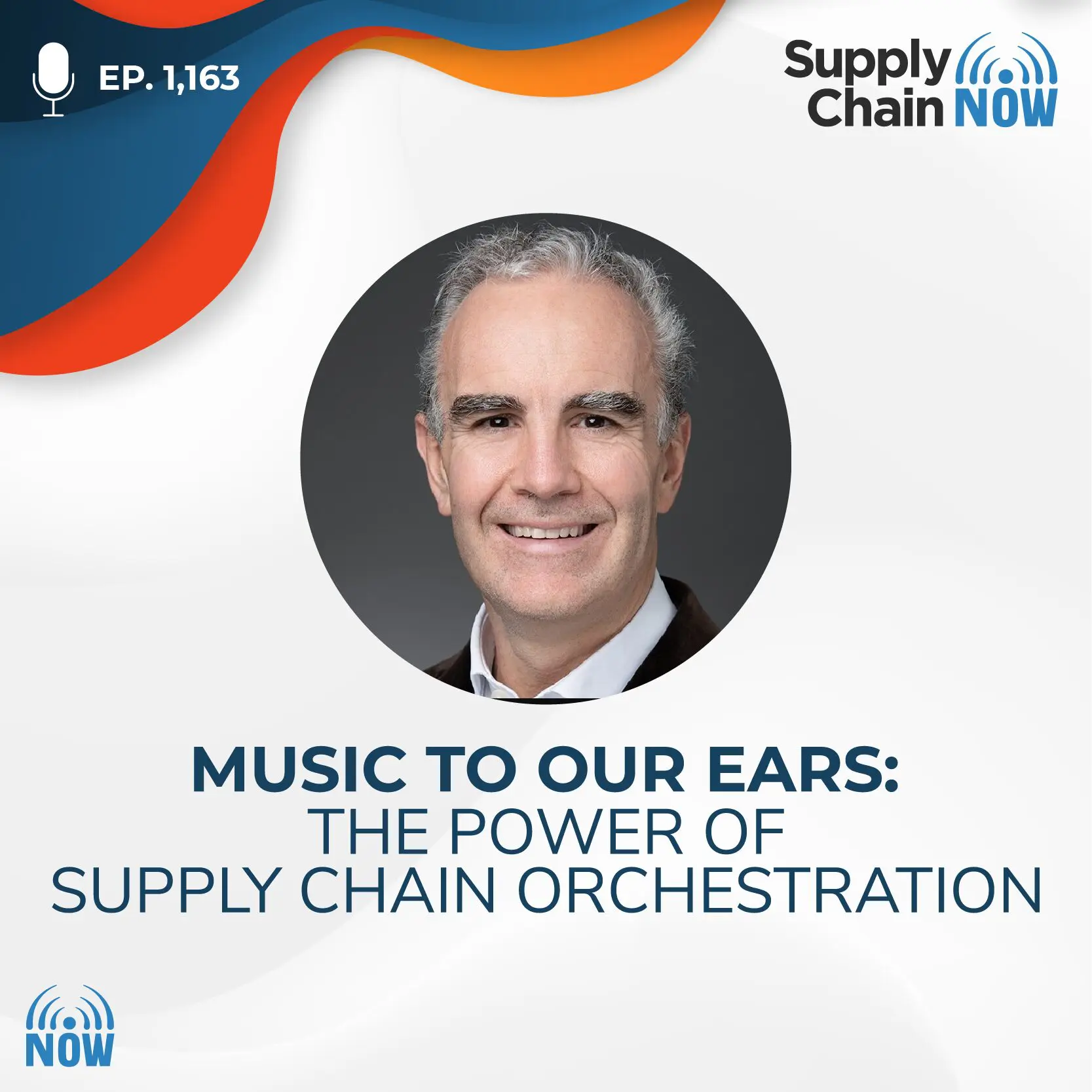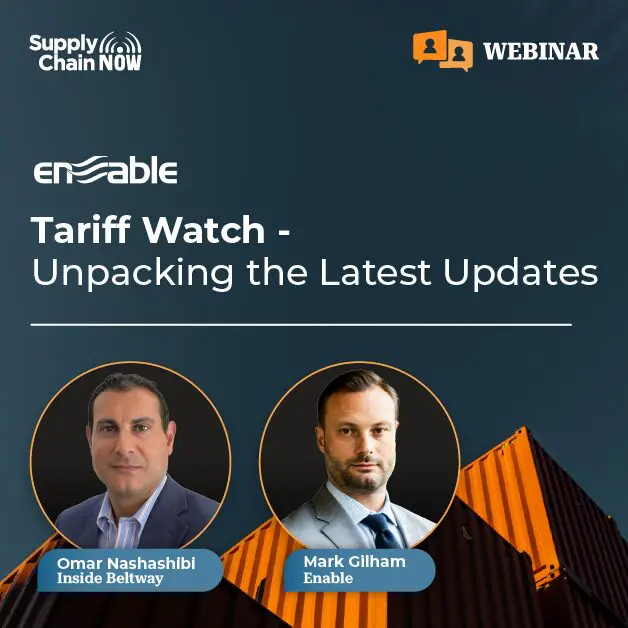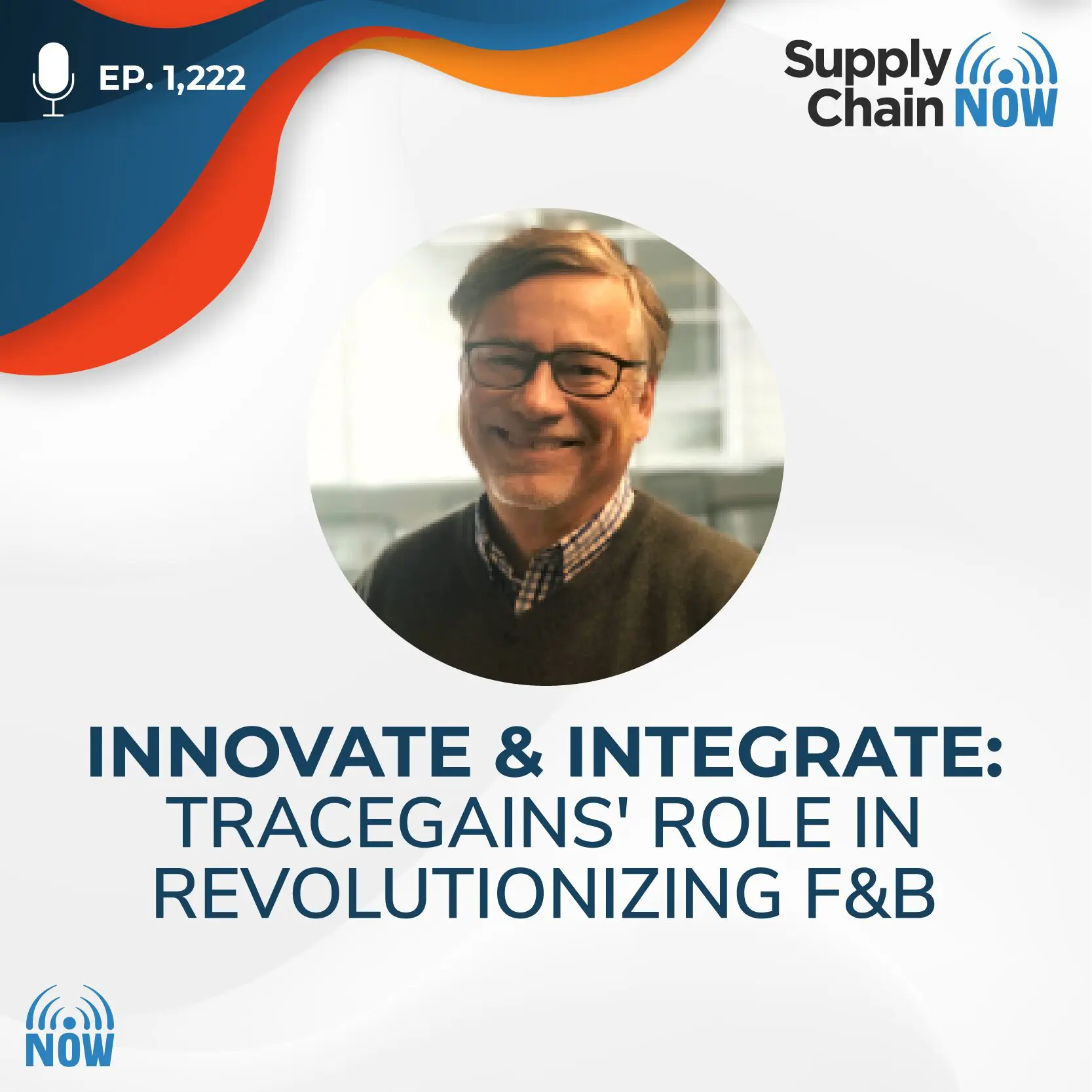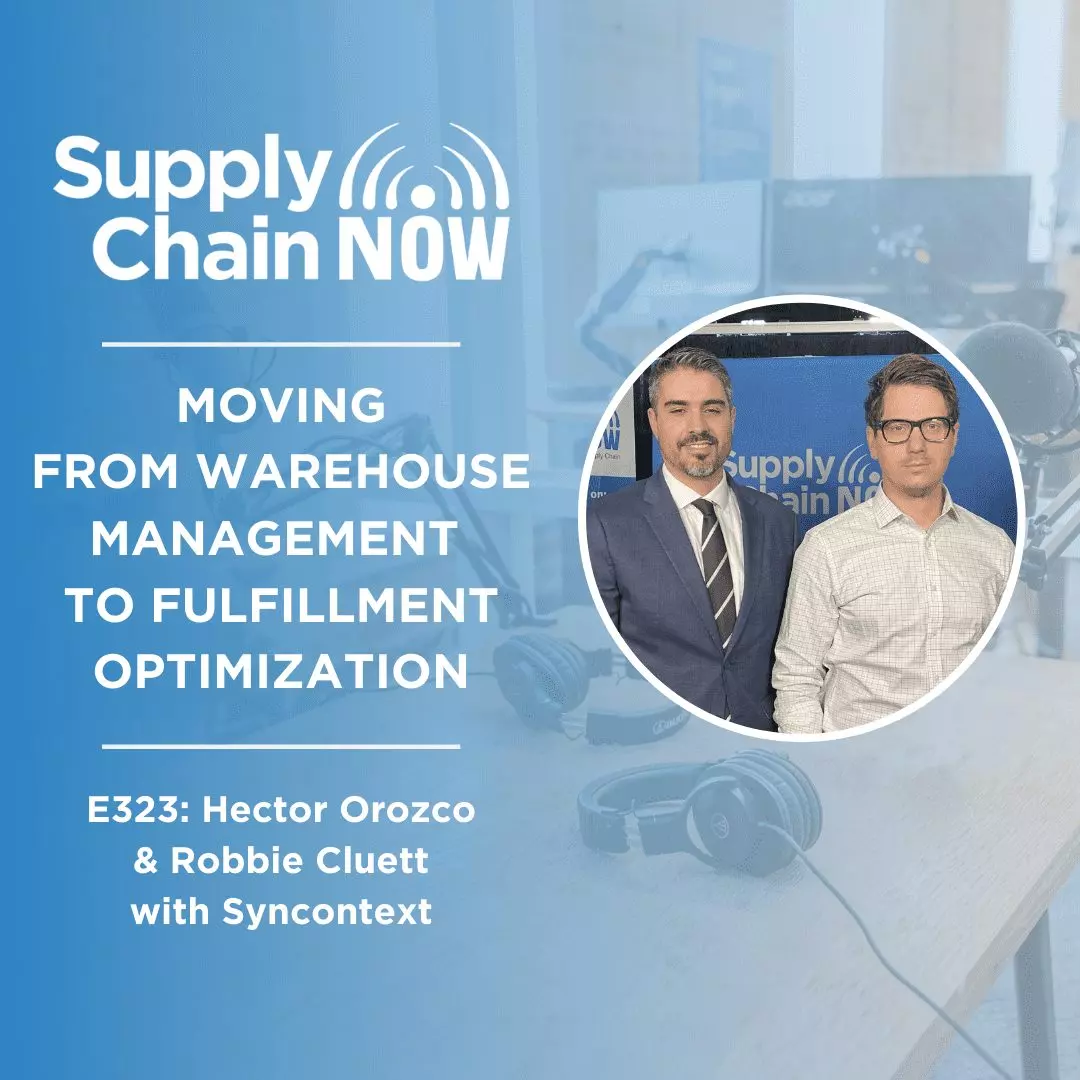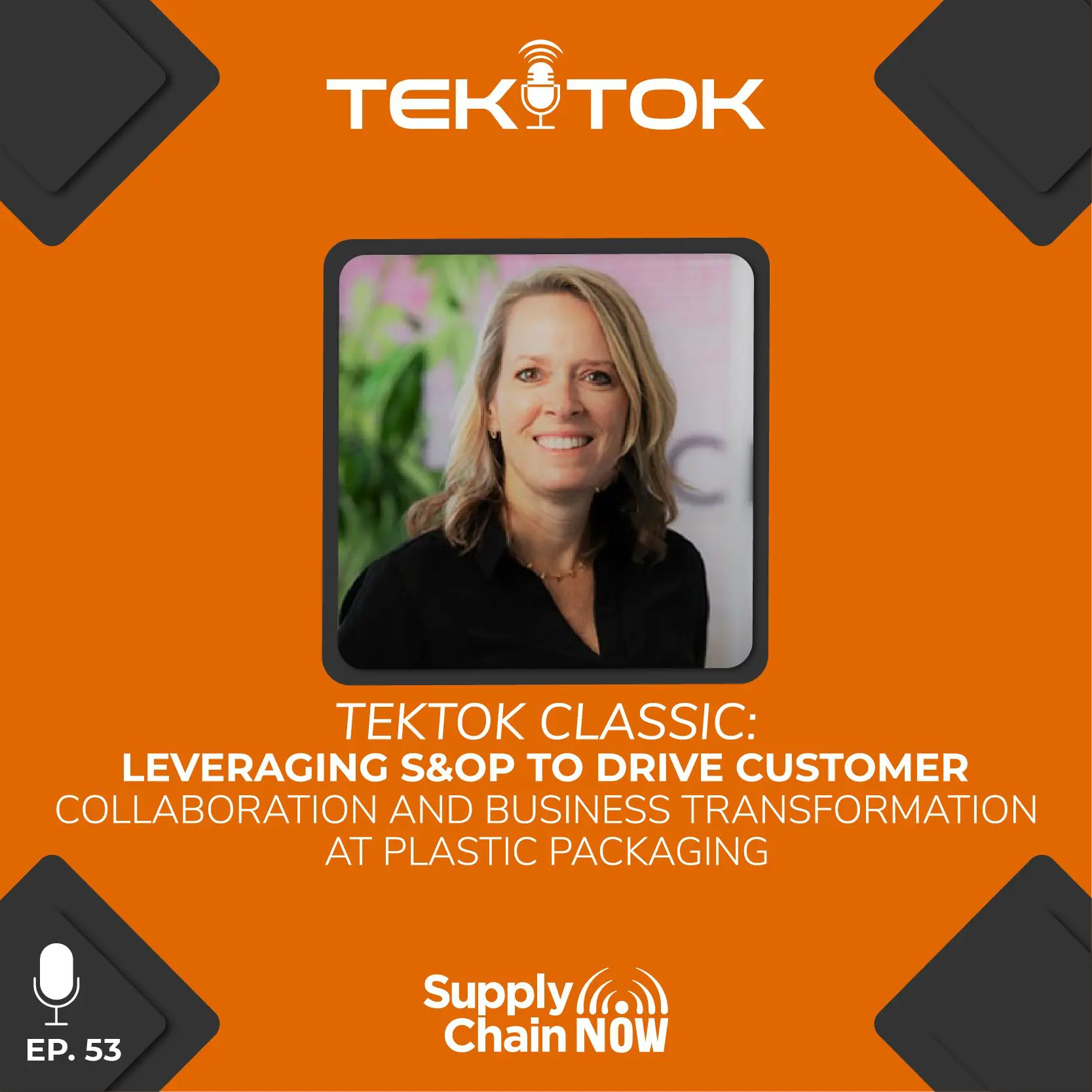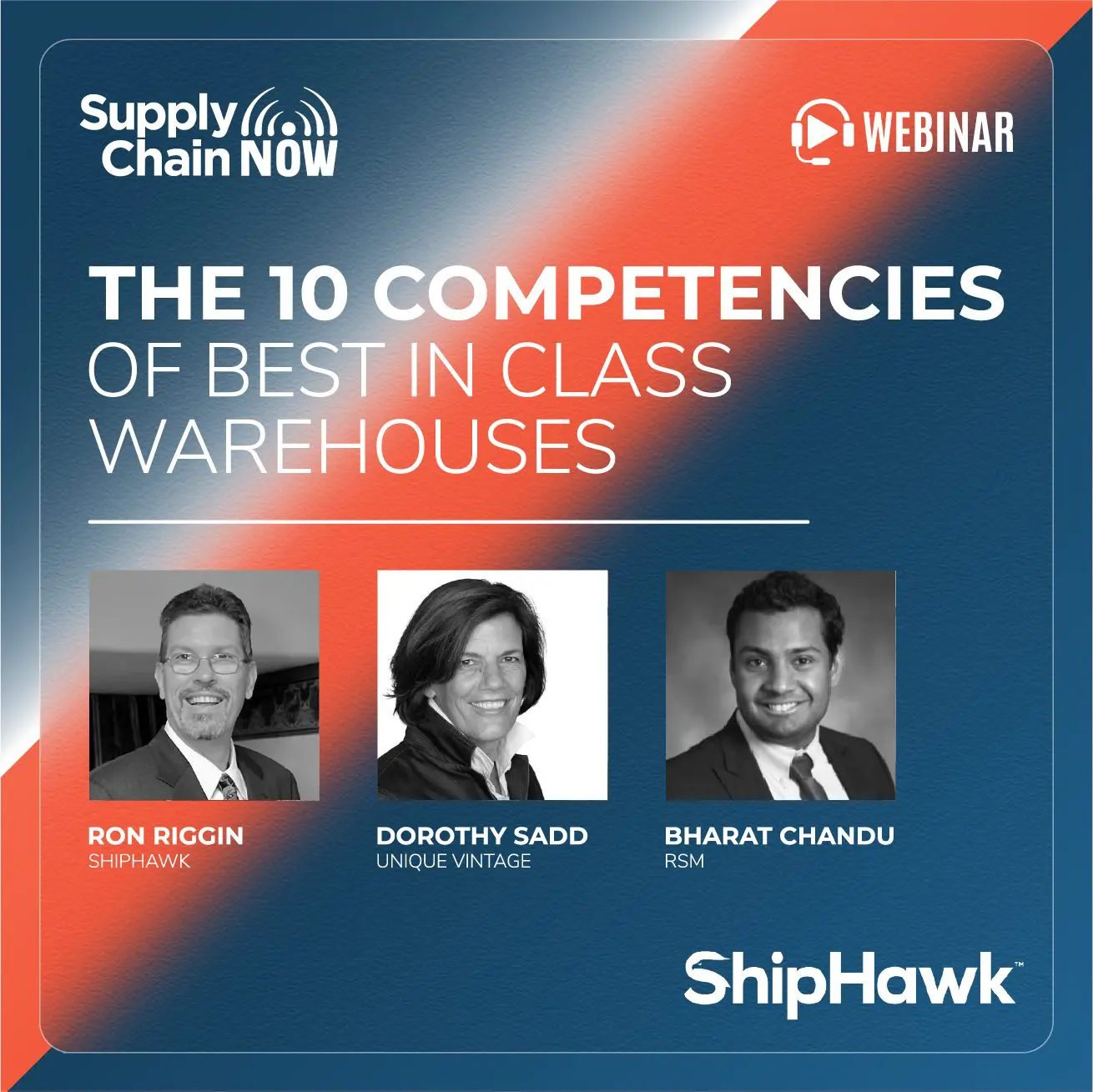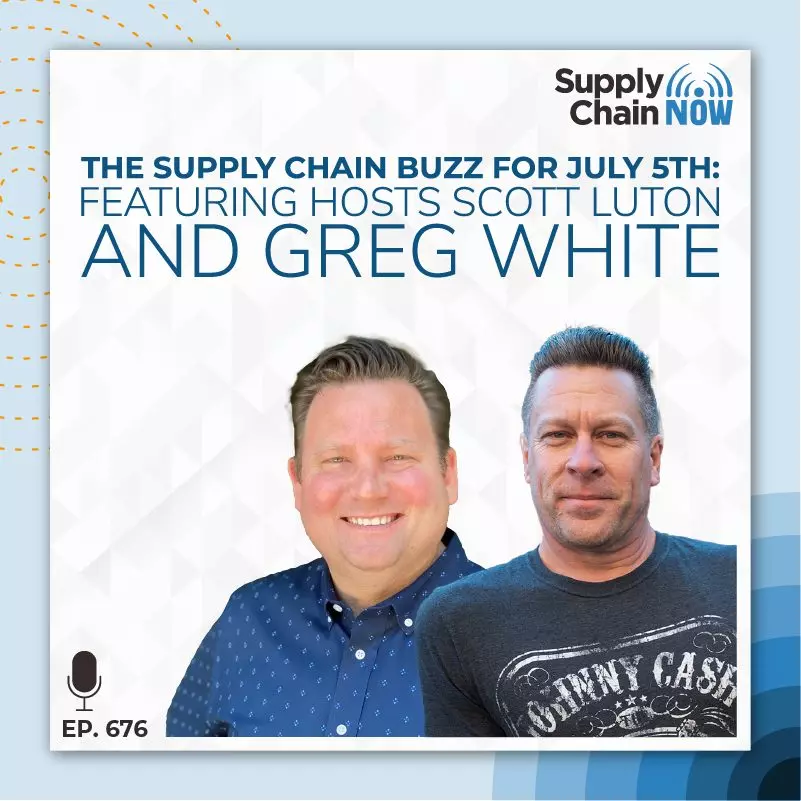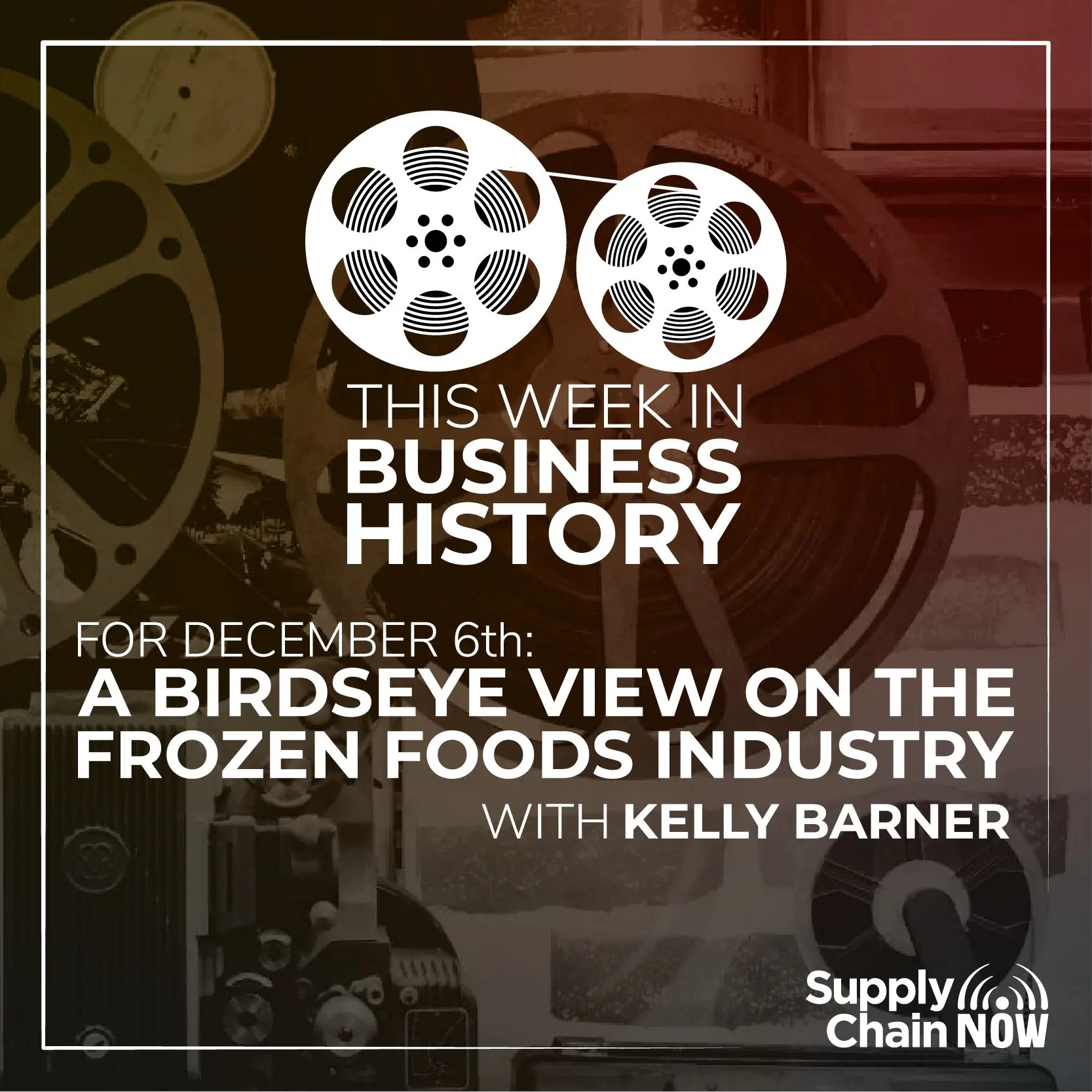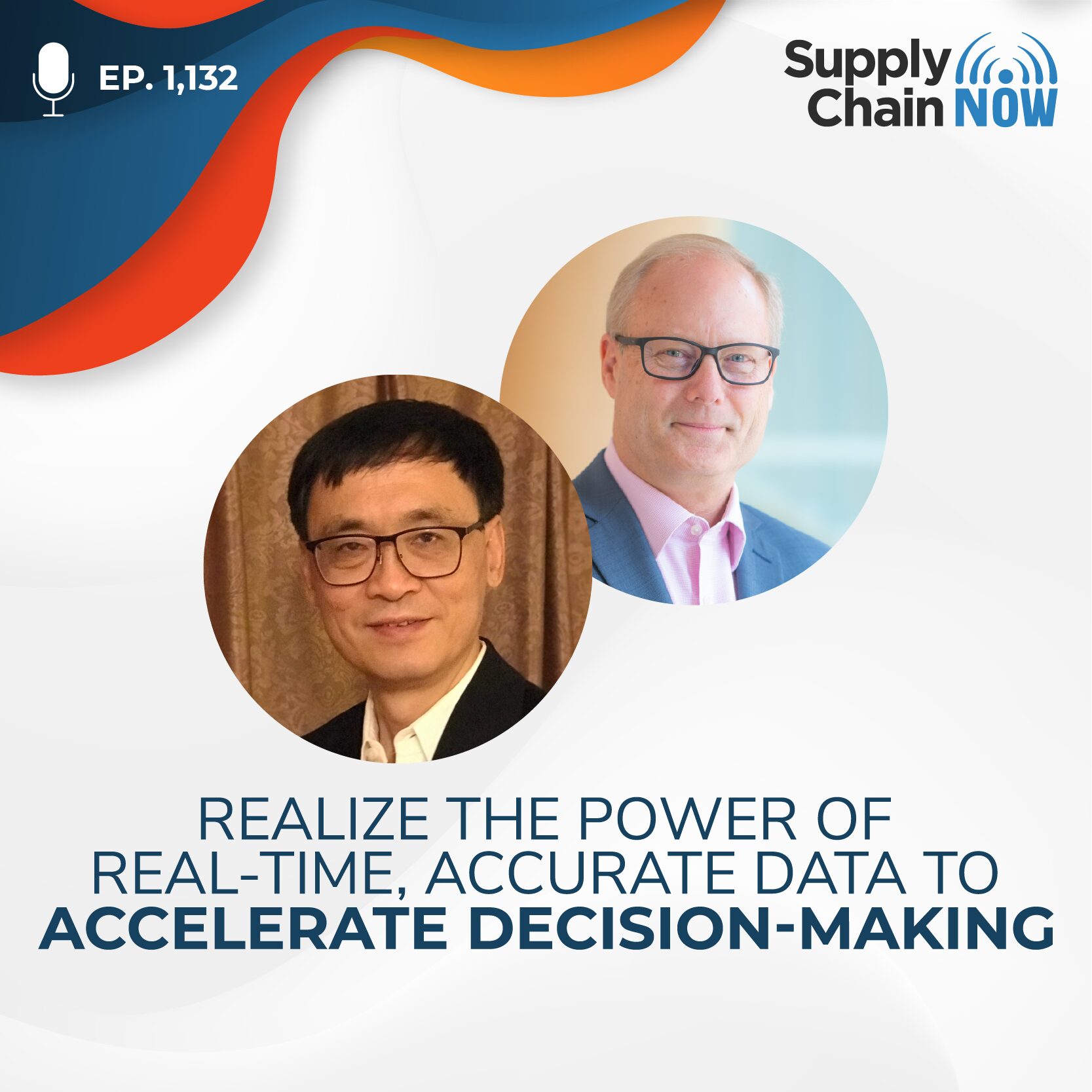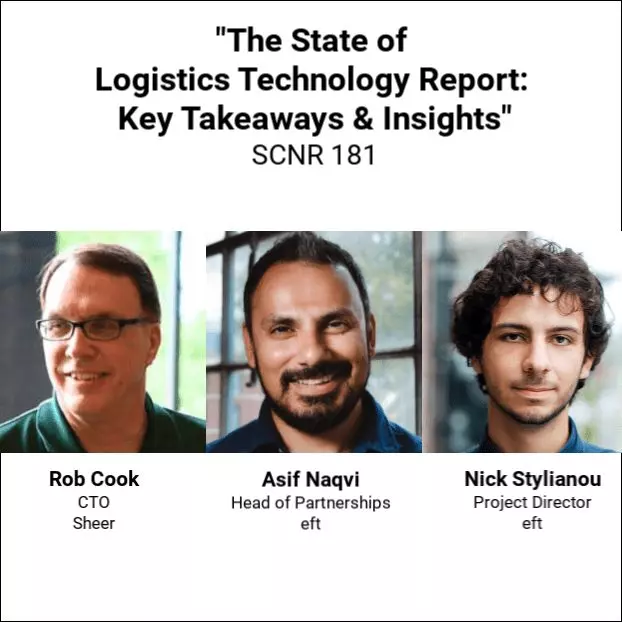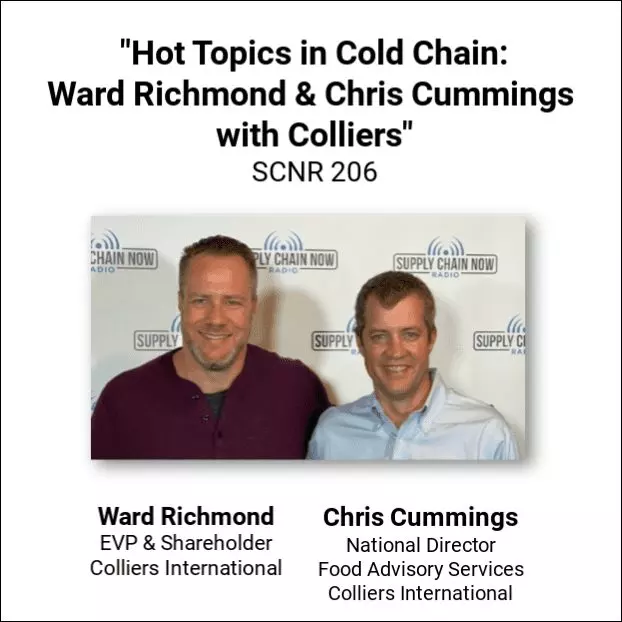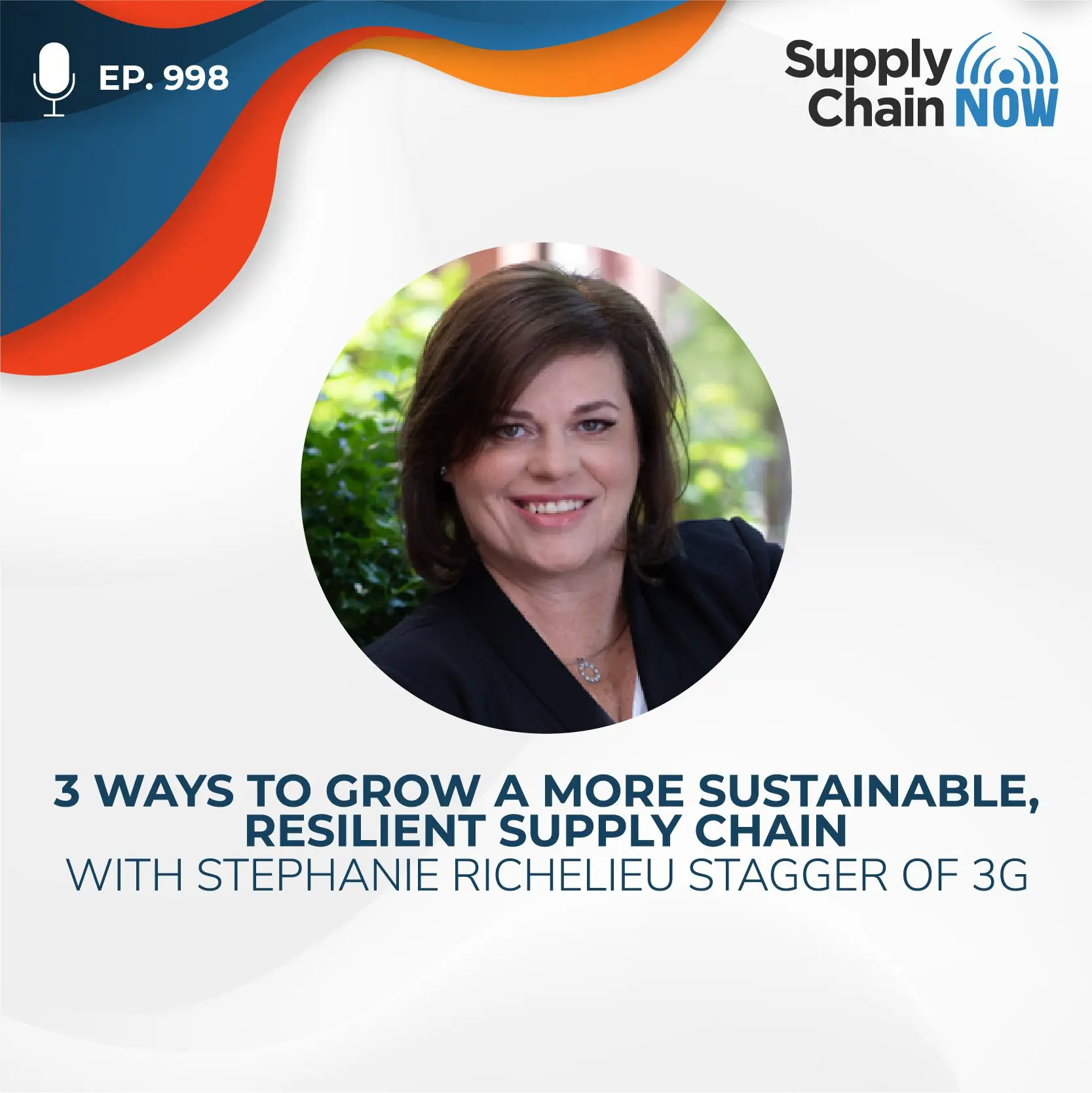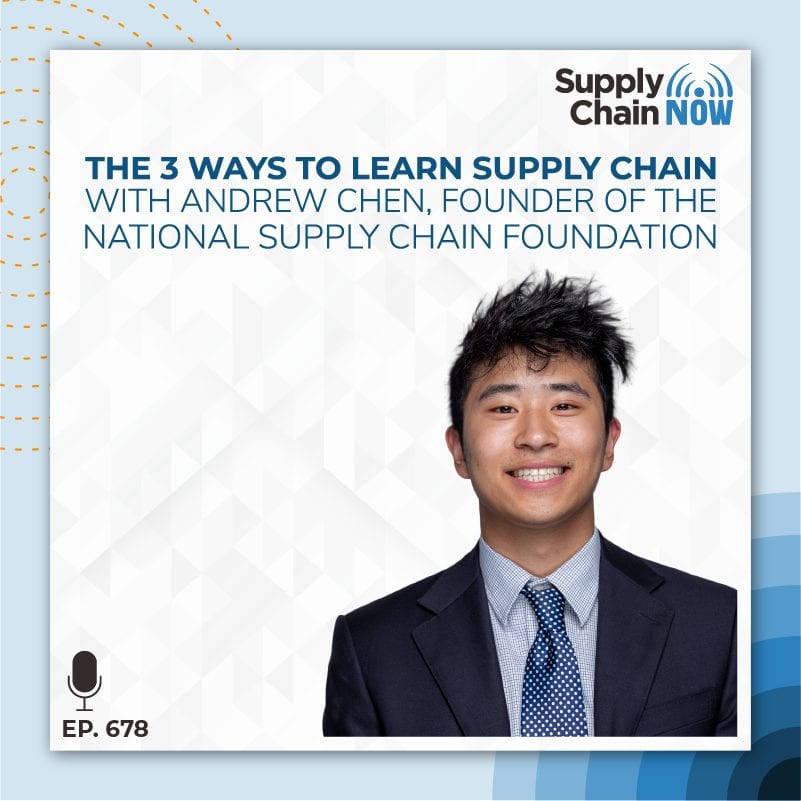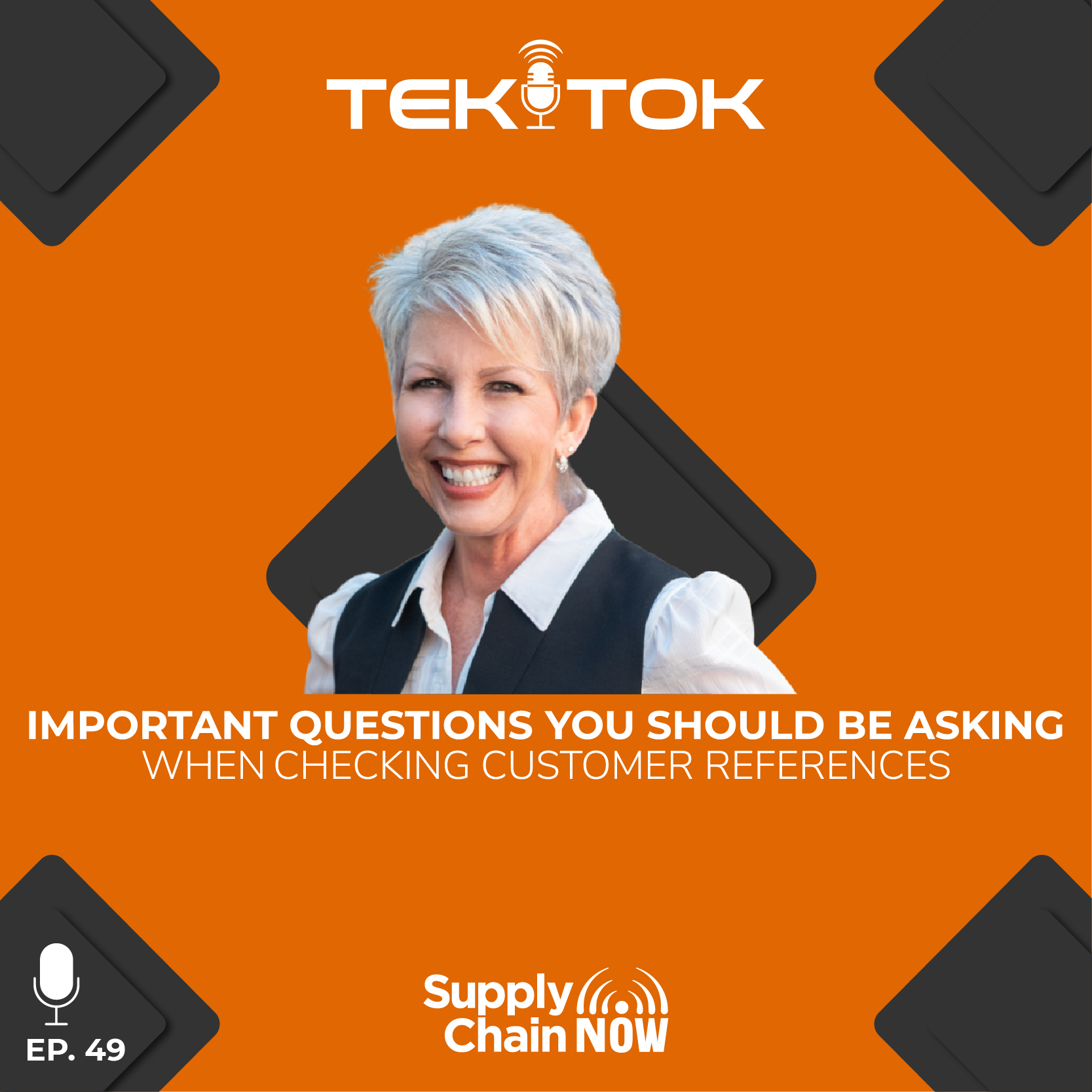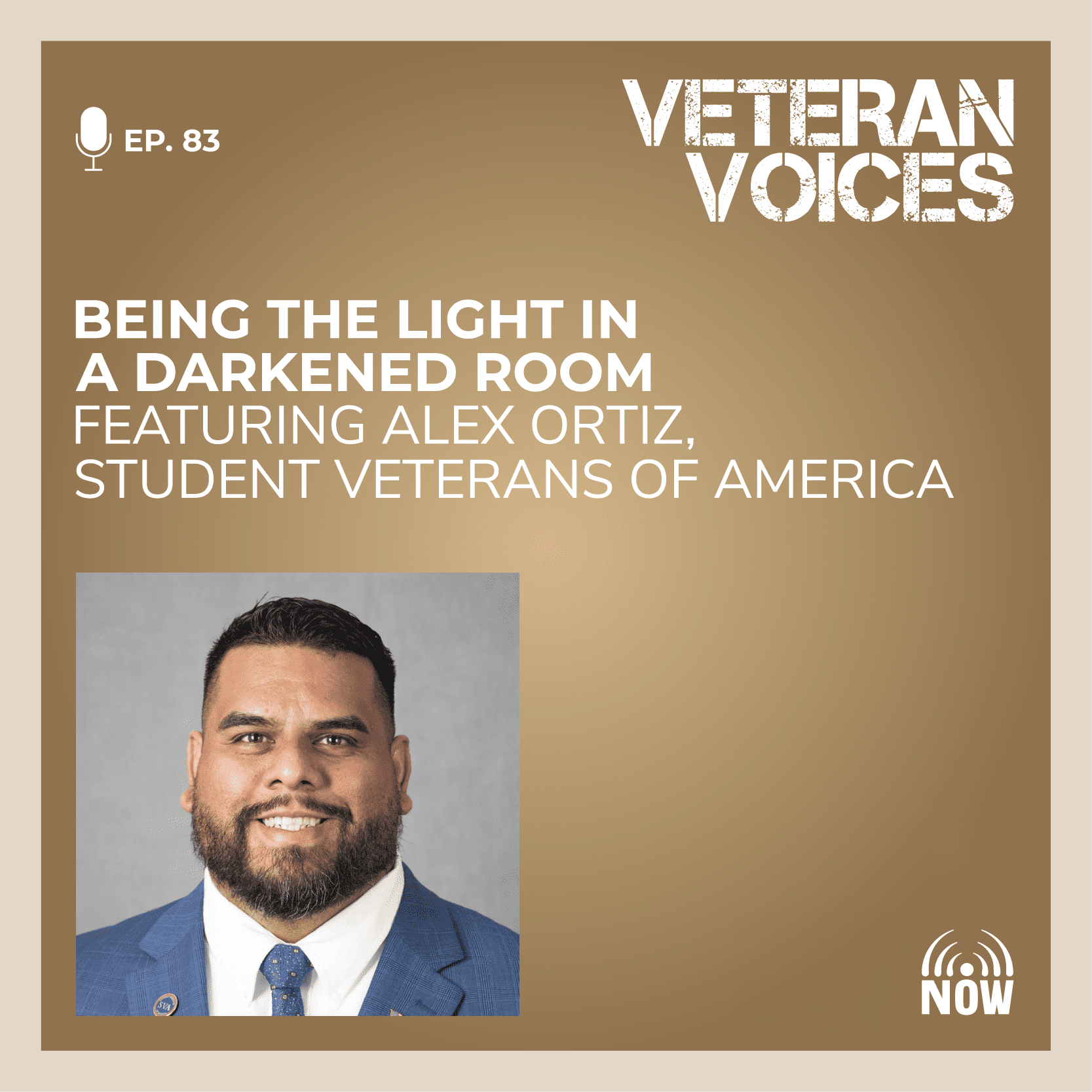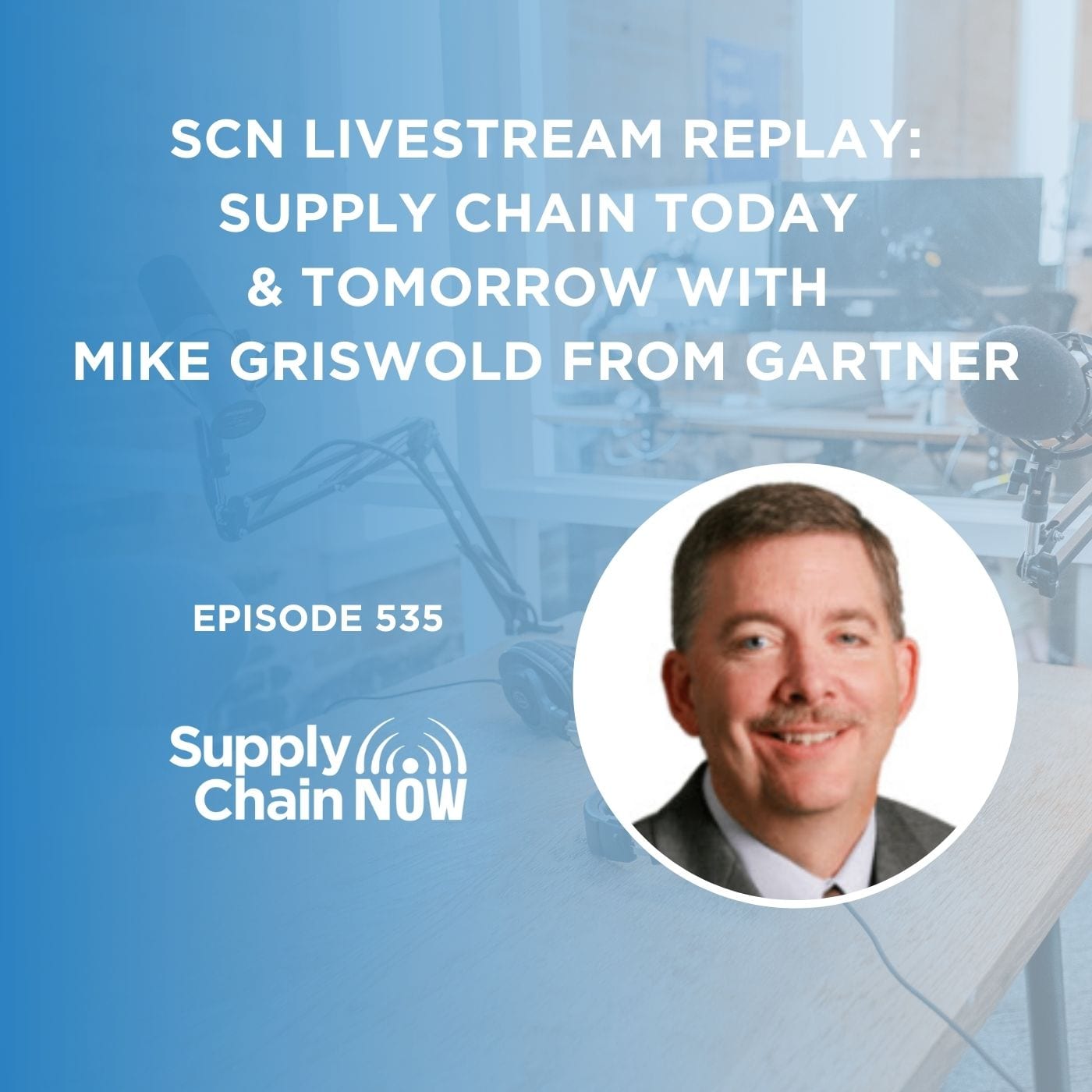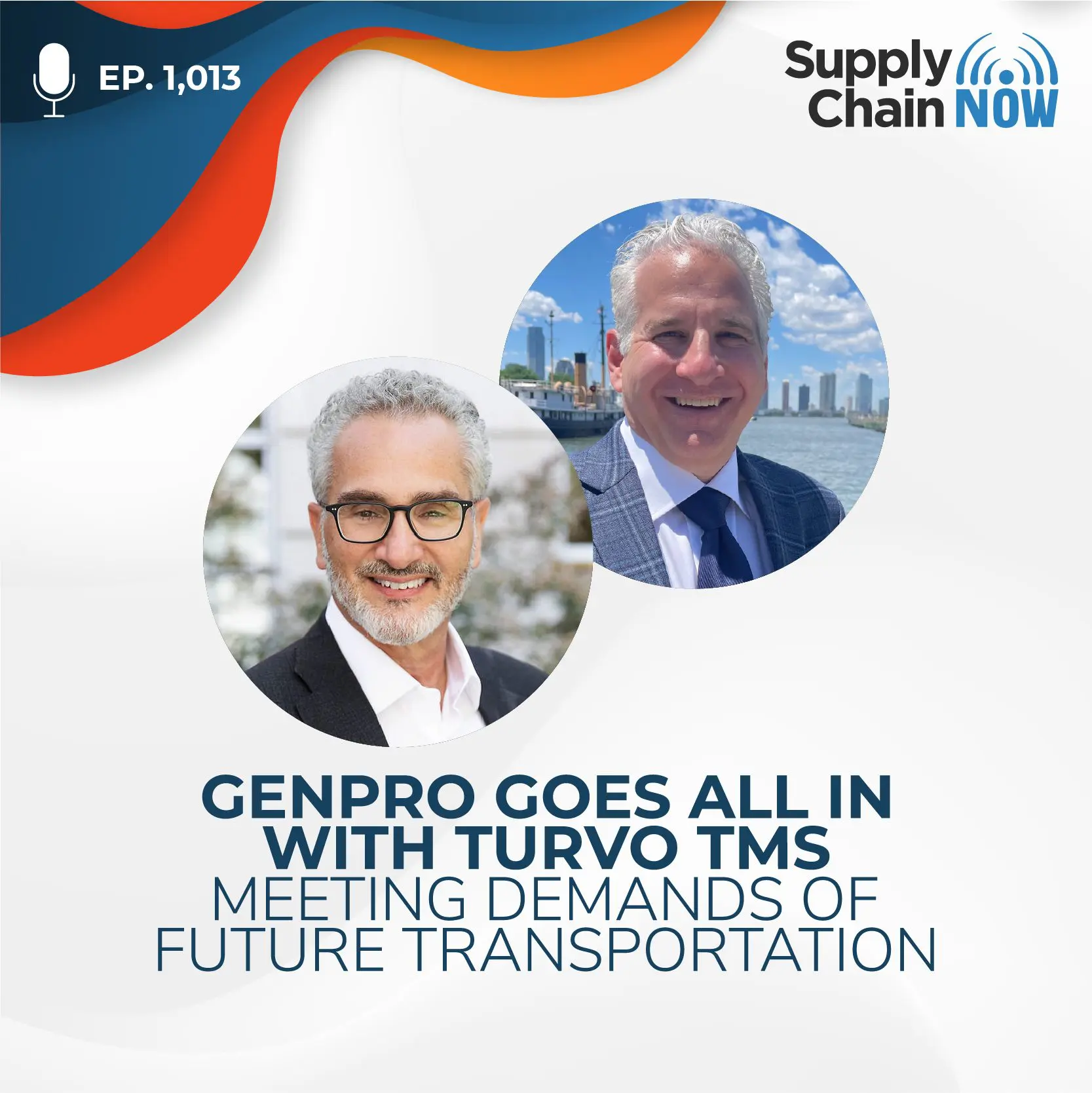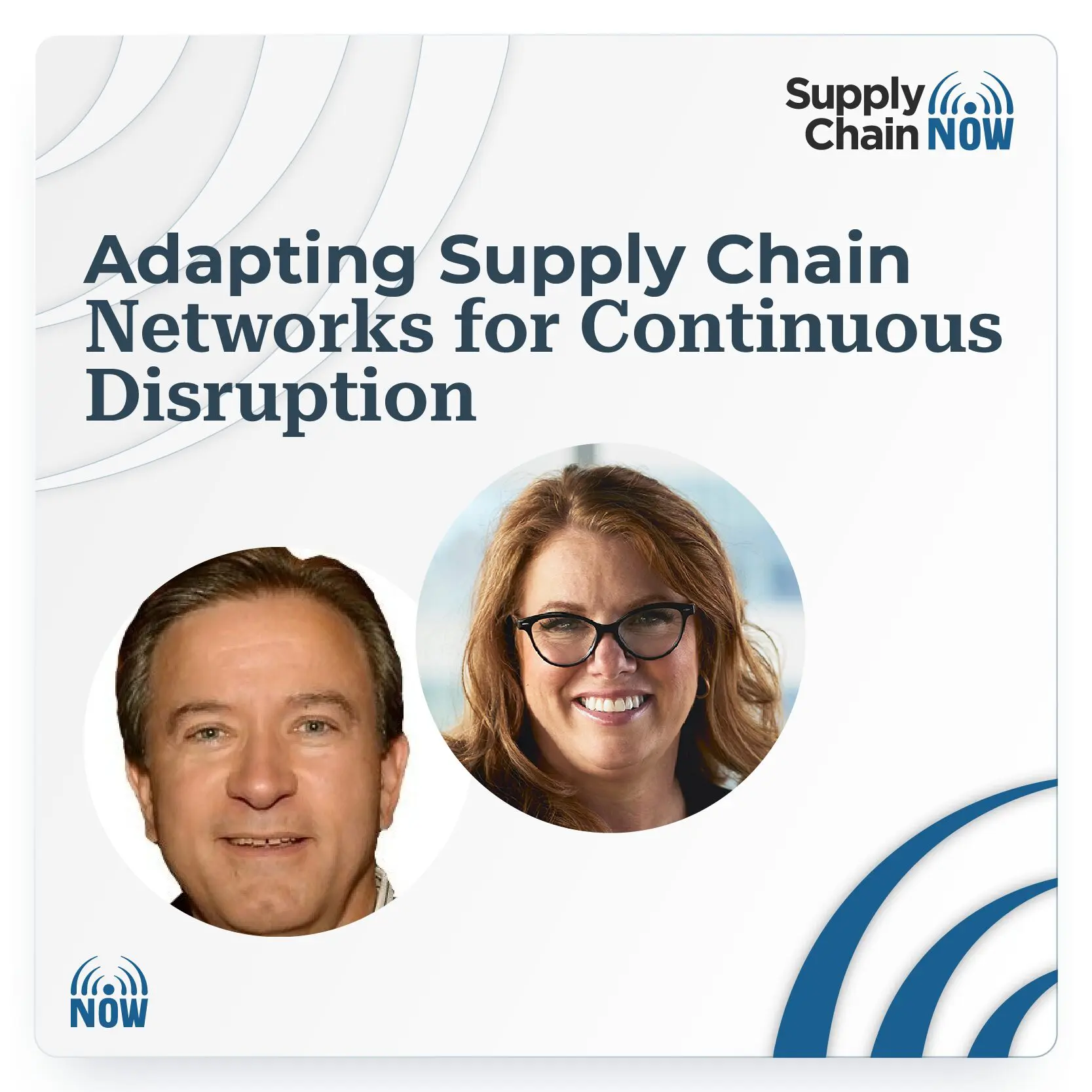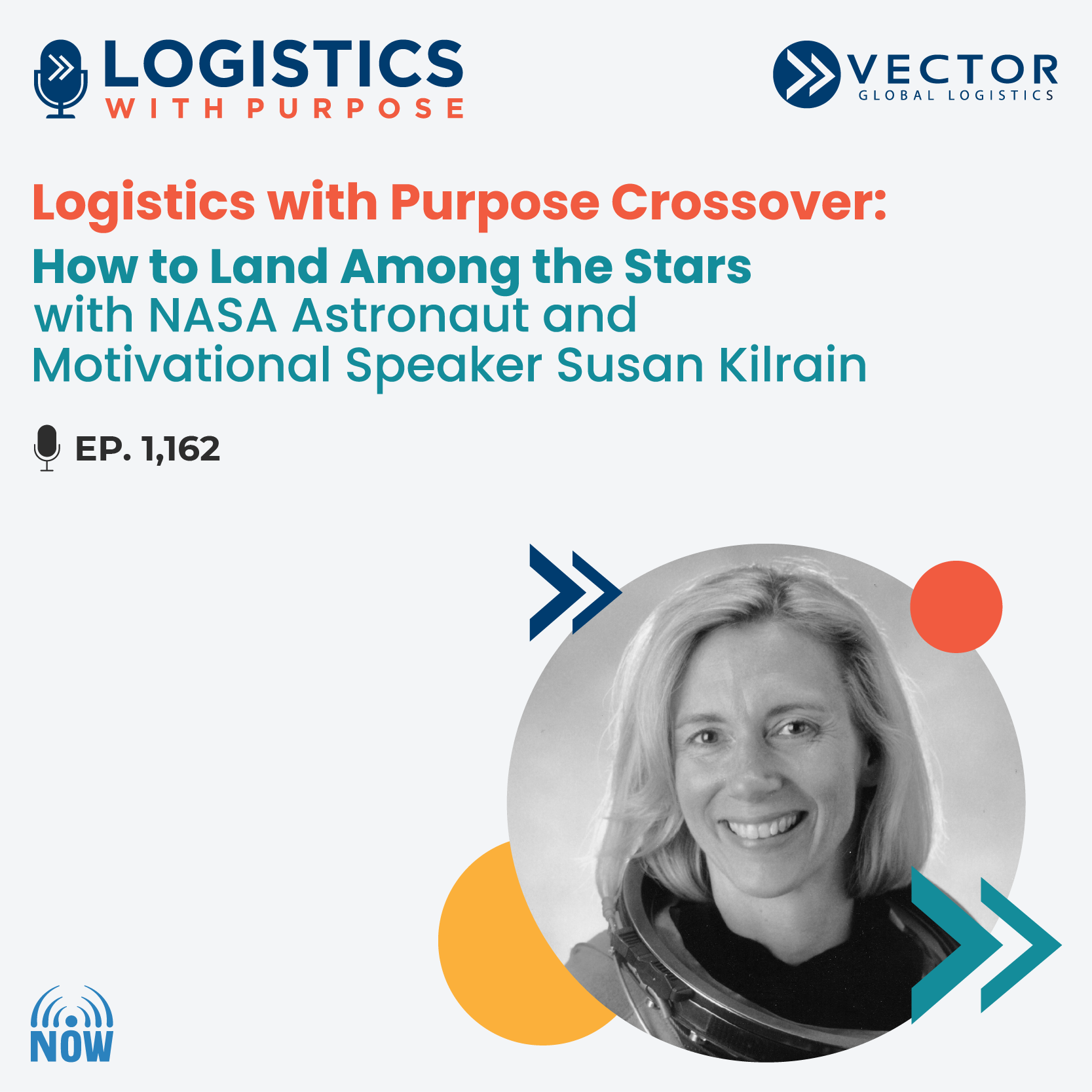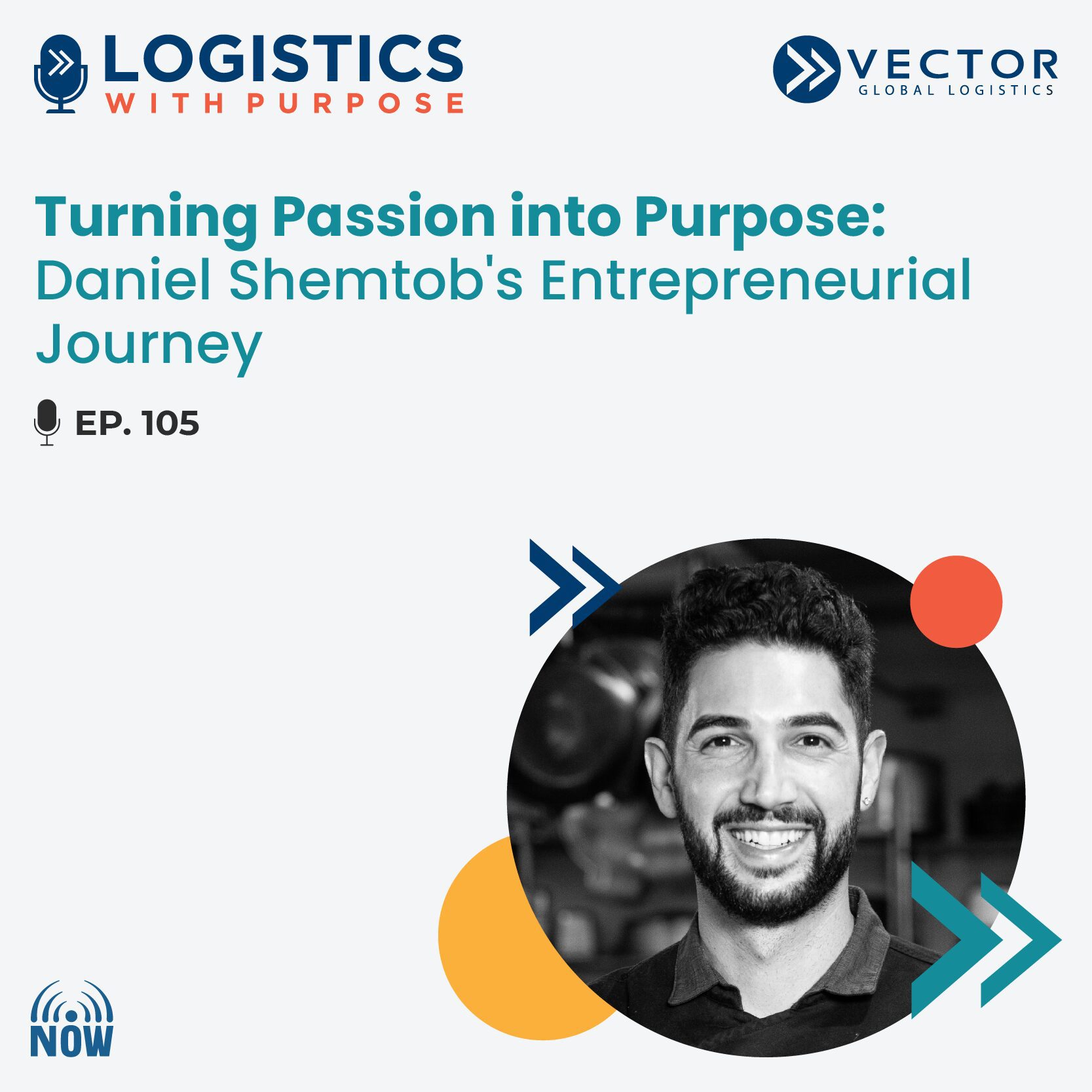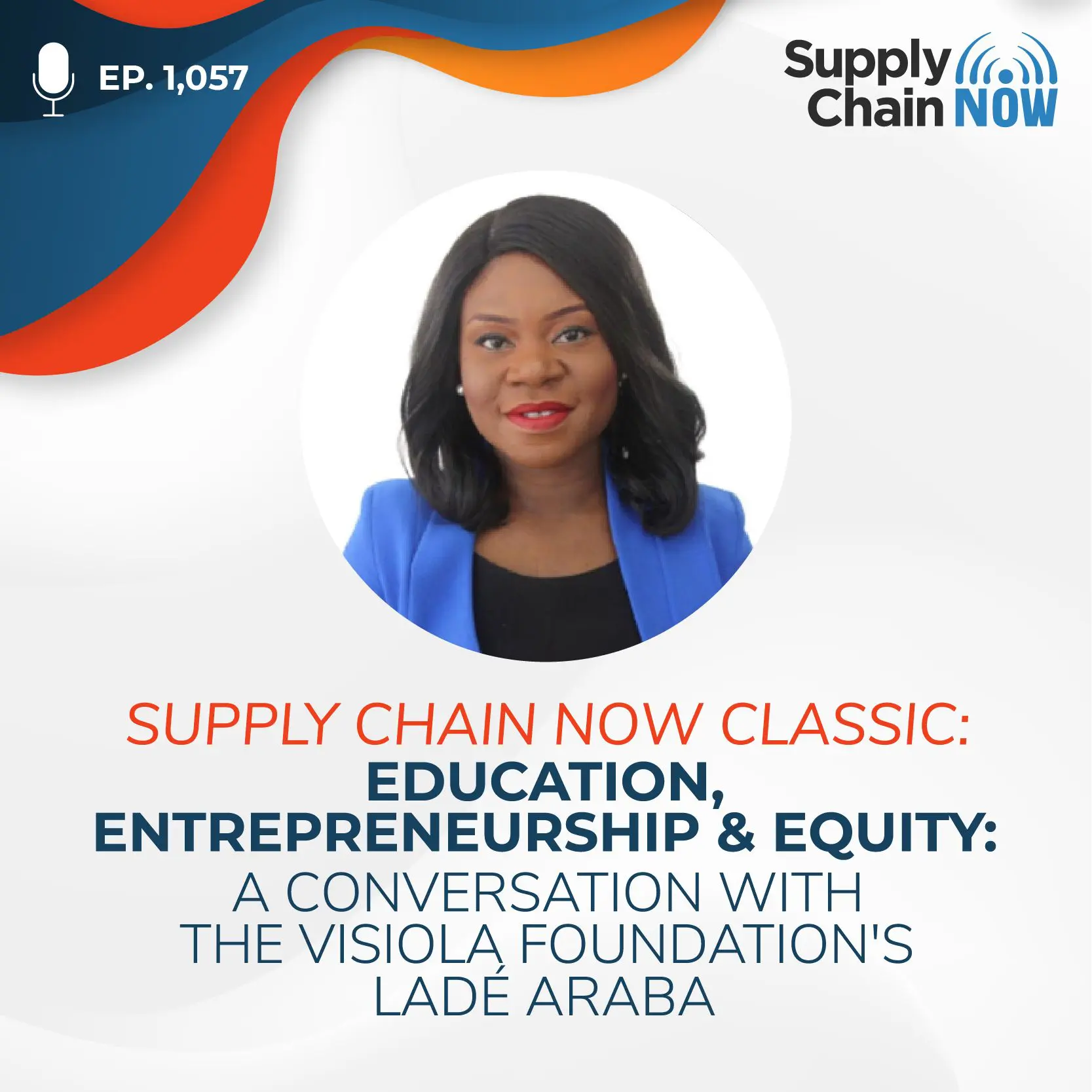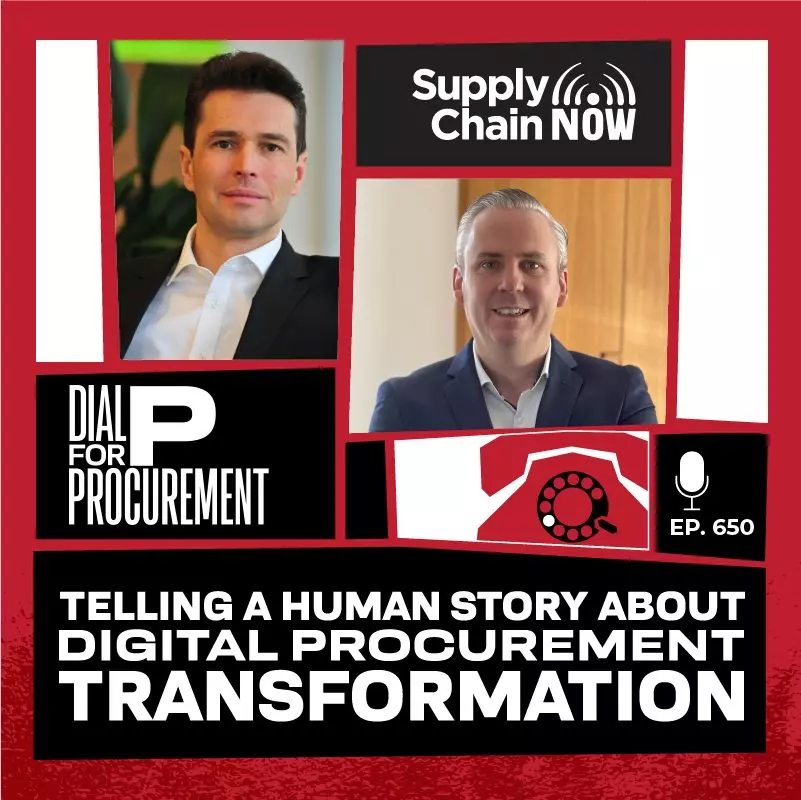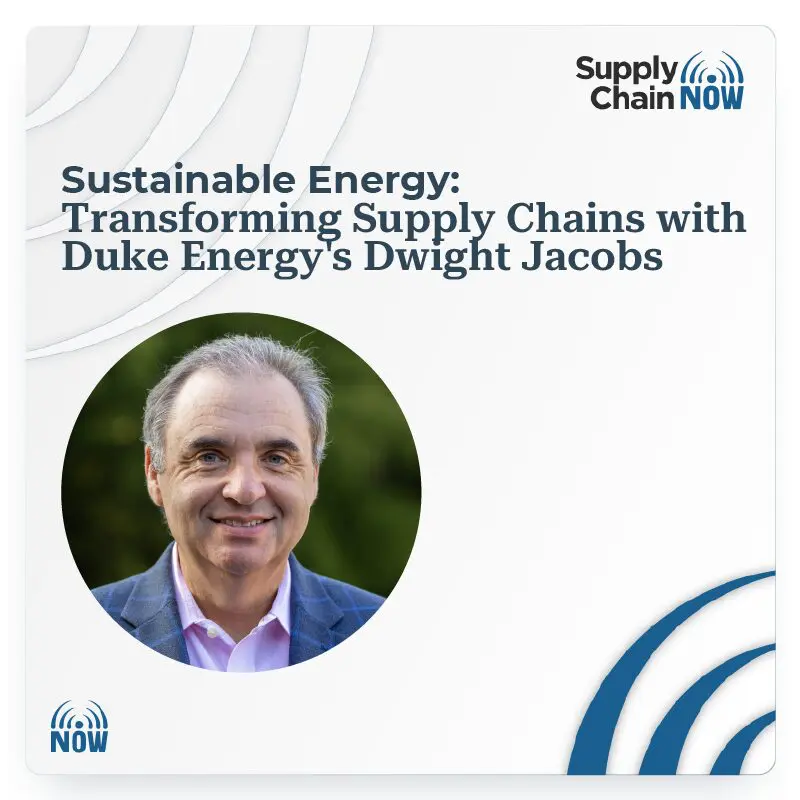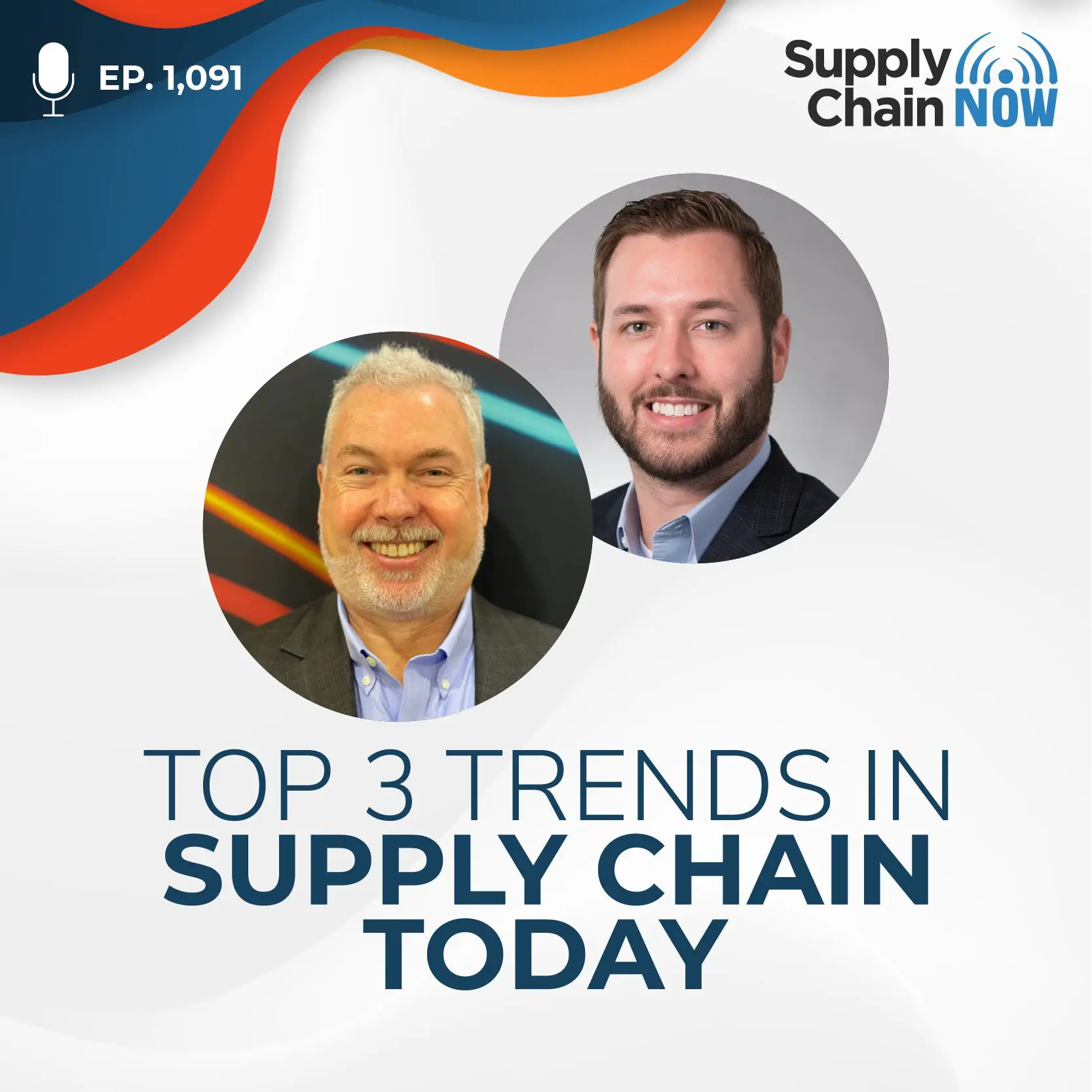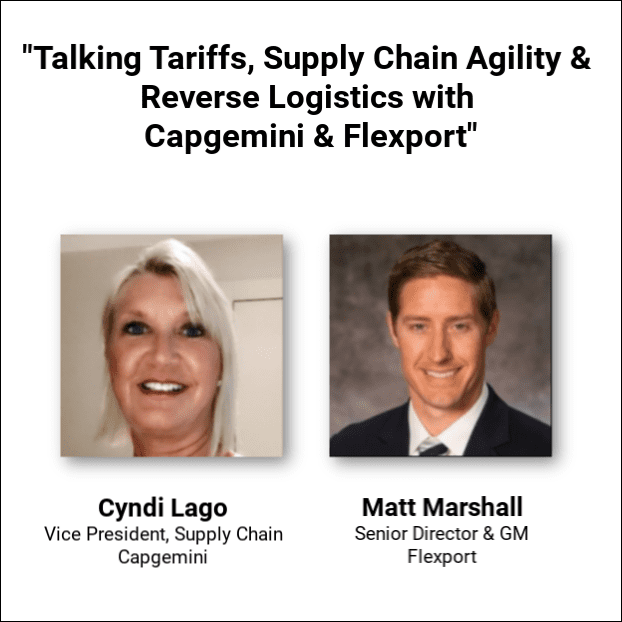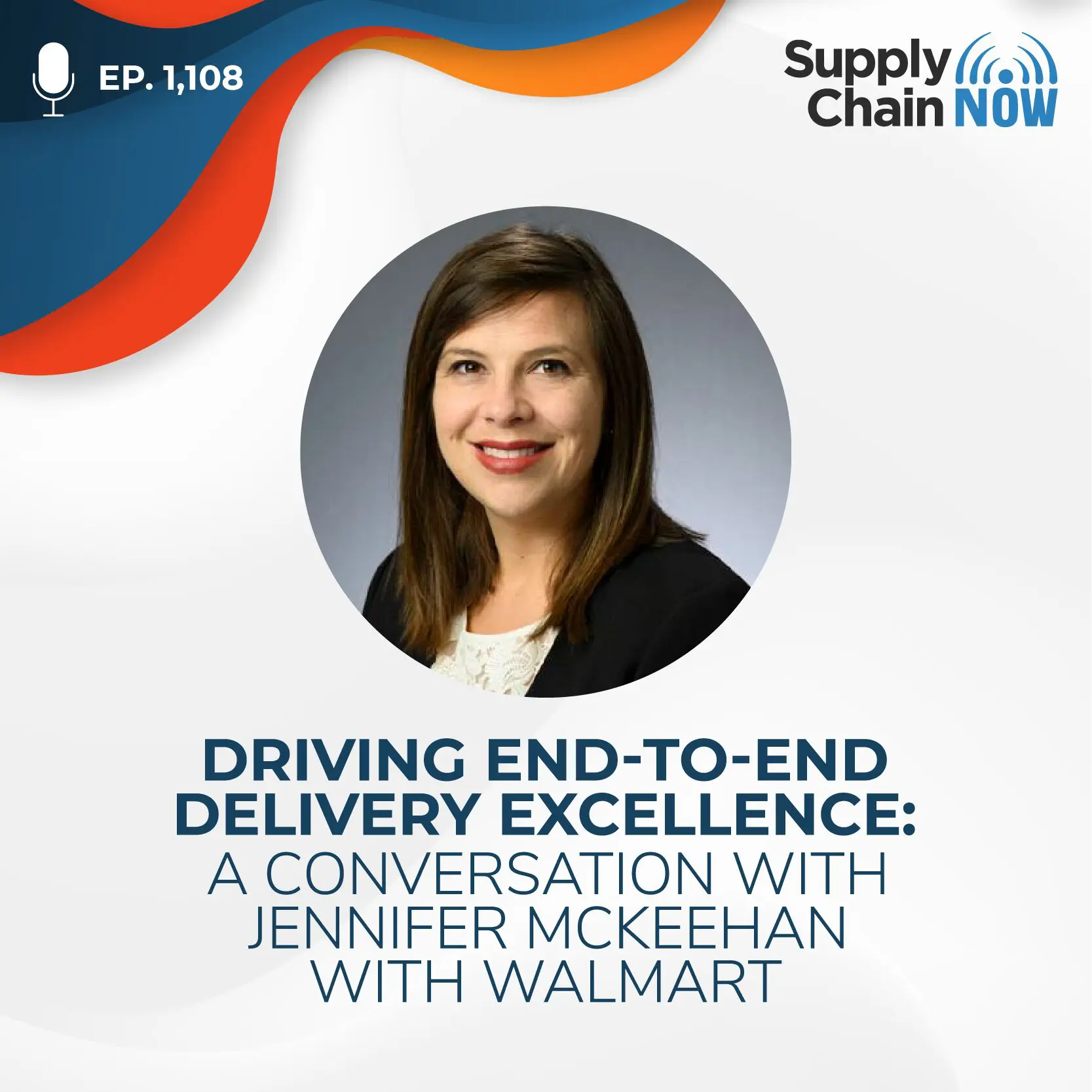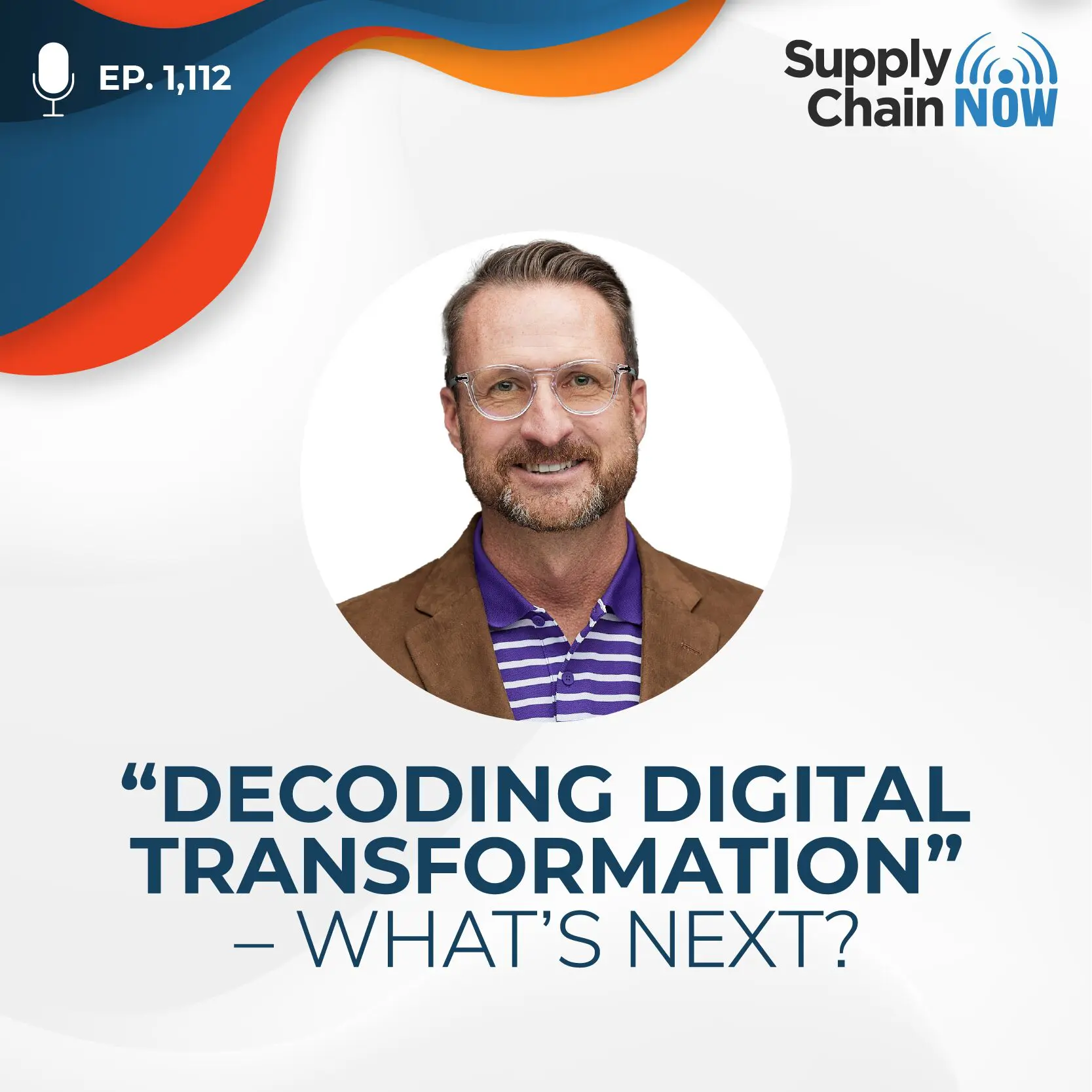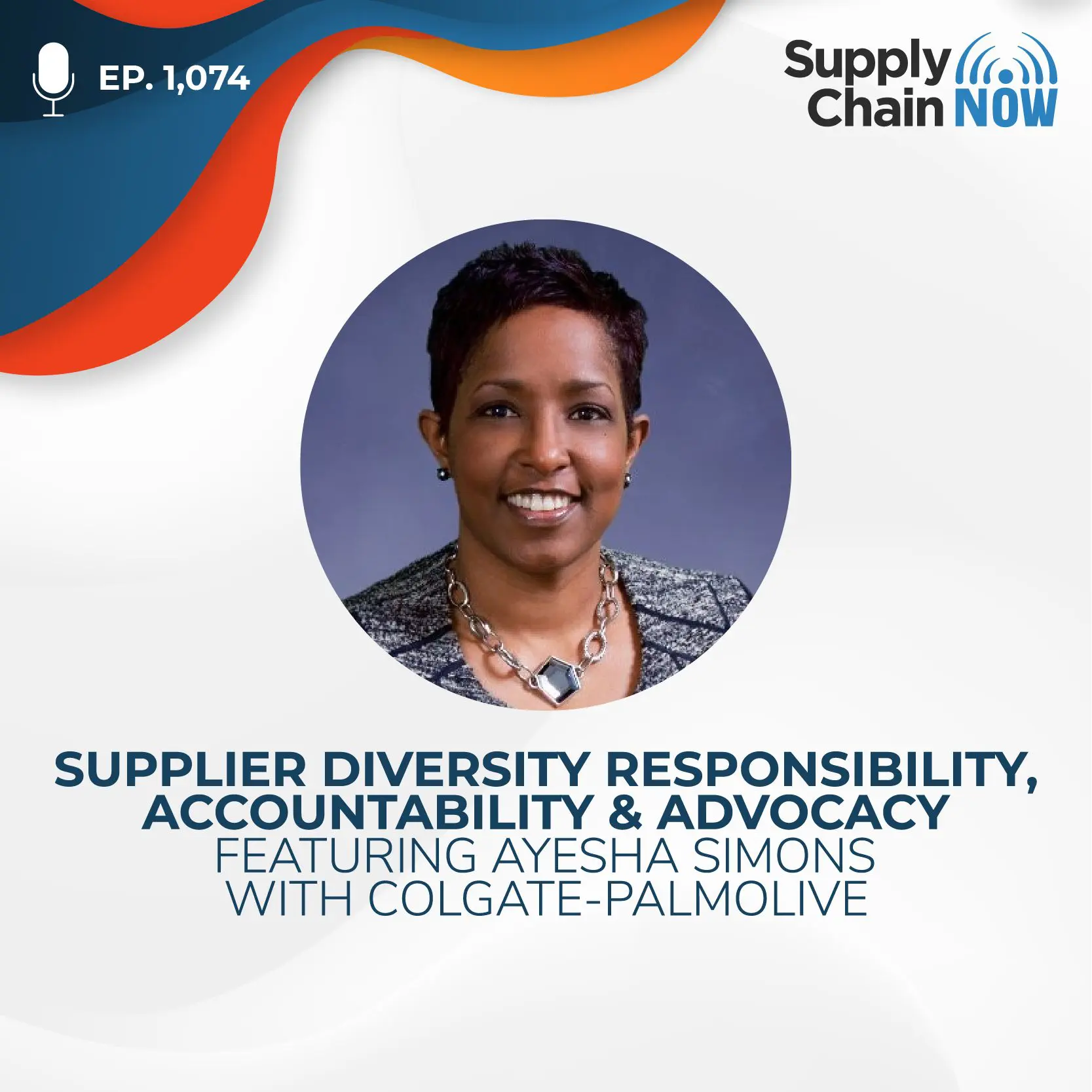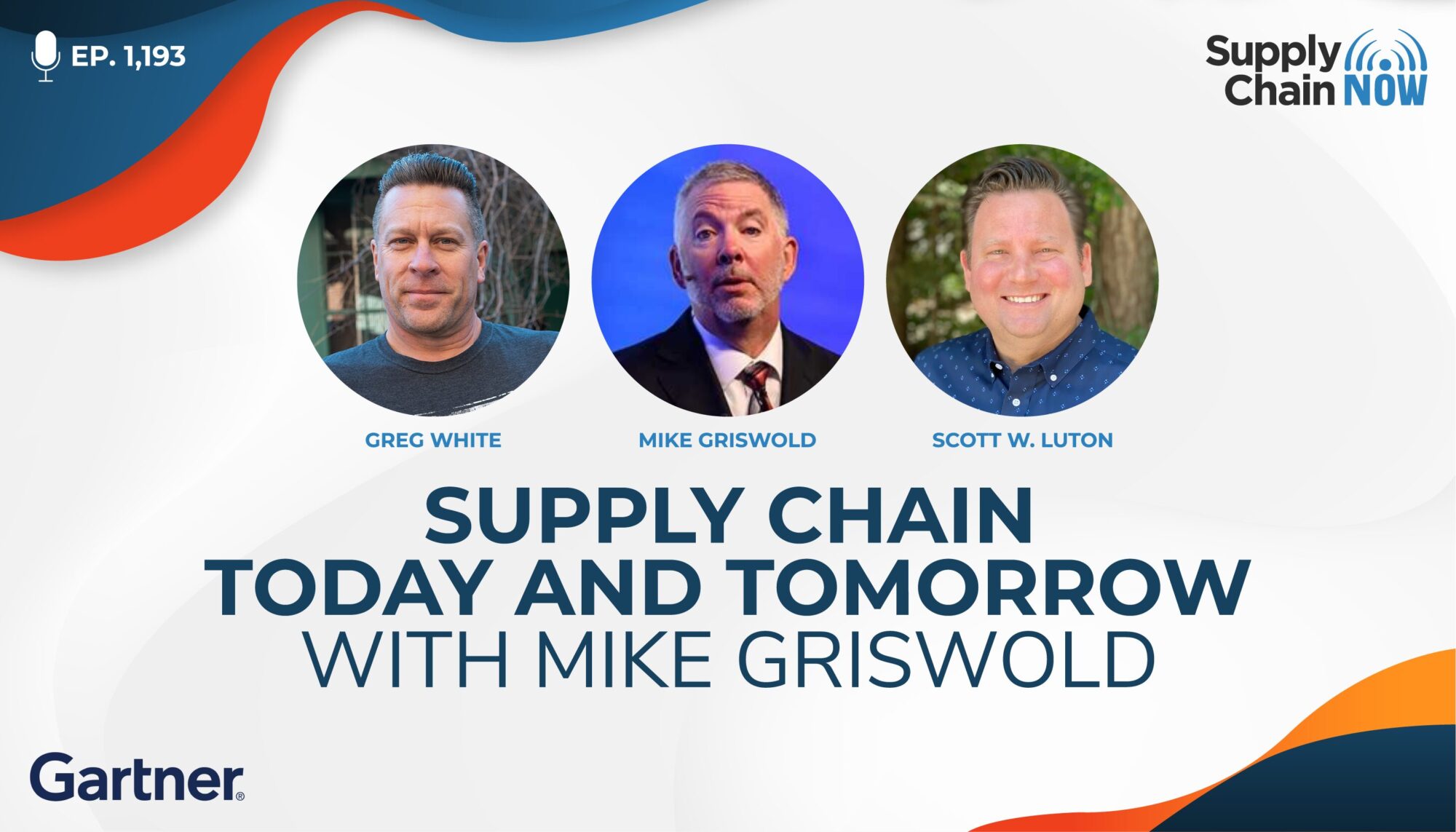
I think companies need to be part of a more broader, more comprehensive sustainability strategy. But I also think you have to know your customer base, because there is a growing number of demographics that actually care about this and are willing to pay more for sustainably sourced products.
-Mike Griswold
Episode Summary
Join hosts Scott Luton and Greg White as they welcome Mike Griswold, VP Analyst at Gartner, back for his popular monthly series, Supply Chain Today & Tomorrow.
In this episode, they discuss and analyze three crucial supply chain stories, covering the UAW strike and its impact on the automotive industry, Amazon’s fulfillment strategy changes, and sustainability efforts in the seafood supply chain by grocery chains.
Listen through to the end as these three experts wrap up with a reflection on a recent Eureka moment from their conversations with business leaders. Tune in for in-depth insights and analysis on these supply chain topics.
Episode Transcript
Intro/Outro (00:03):
Welcome to Supply Chain. Now the voice of global supply chain supply chain now focuses on the best in the business for our worldwide audience, the people, the technologies, the best practices, and today’s critical issues, the challenges and opportunities. Stay tuned to hear from Those Making Global Business happen right here on supply chain now.
Scott Luton (00:32):
Hey, good morning, good afternoon, good evening, wherever you’re Scott Luton and Greg White with you here on Supply Chain. Now welcome to today’s live stream, Greg, how are we doing?
Greg White (00:43):
Sliding in on two wheels. Barely made it, but you’ve been with us earlier this week, folks. You may have noticed I’ve had some technical challenges.
Scott Luton (00:51):
Well, you know what though, Greg, we are
Greg White (00:54):
No
Scott Luton (00:54):
Outright overcoming any technical challenge out there, and I think you look bright and brisk and sharp and vibrant, and that’s all
Greg White (01:04):
The dolly
Scott Luton (01:05):
Adjectives I could come with. Greg,
Greg White (01:06):
That’s pretty good. Thank you. I appreciate that.
Scott Luton (01:09):
As usual, you’re testing my English ability. I feel
Greg White (01:12):
Great. I do feel great. But yeah, thank you.
Scott Luton (01:16):
Well, you should feel good at least for the next hour because we’re continuing one of our most popular long running series here, supply chain today and tomorrow with the one only Mike Griswold with Gartner. Now Greg, and as all of our regular listeners know today on today’s show, we’re going to be sharing a few developments across global supply chain, really across global business, and we’re getting Mike to weigh in with his valuable one of a kind take. Is that pretty accurate, Greg?
Greg White (01:42):
Yeah, yeah, of course, of course. I mean the great thing about Mike is he’s been there and done it and now he’s talking to hundreds, probably thousands of people a year who are still doing it either providing services or actually doing the supply chain thing, mostly in retail, which is so fascinating, so risky. So yeah, he’s the voice of the industry man.
Scott Luton (02:09):
So usually I get to hang out with the smartest person in the room. Now I get to hang out with two of the smartest people in the room with Mike and Greg. So stay tuned folks. We’re going to talk about the automotive strike we’re going to talk about and some of what’s to come there. We’re going to be talking about seafood transparency and provenance, really, Greg, one of your favorite words and a whole lot more. So stick around and let us know what you think. So drop your comments in the chat. Love to share those throughout the session. Alright, Greg, before we have Mike join us, we got a couple of resources that we want to share with folks, right?
Greg White (02:43):
Yes, as far as I know,
Scott Luton (02:45):
As far as kind of flying blind today. Okay, so Greg, as we talked about on the buzz on Monday, and folks join us every Monday at 12 noon eastern time for the tip of the spear in terms of supply chain, business news across the globe,
Greg White (03:01):
The most popular show in supply chain.
Scott Luton (03:04):
Yes, Greg, absolutely
Greg White (03:05):
By a long shot. So says whoever says that Chartable and those other folks that tell everybody how podcasts do
Scott Luton (03:14):
More than a knows we’re winning the race more, much more than via notes, but folks check out. With that said, it’s our LinkedIn, primarily LinkedIn and email newsletter. We dropped it over the weekend. We had a Halloween theme, but we featured on a lot of news that might be in your blind spot and including some great perspective and takes. And Greg, as we talked about the other day, each week as we drop this in, with that said, you’ll get the week’s upcoming live events. So Greg, it serves as a great reminder for folks that want to jump in and plug in and be a part of those, right?
Greg White (03:47):
It is, and this one was really interesting. It was a ton of kind of catching up on news and additional news that we don’t necessarily get to touch base on throughout the week. So yeah, I like it. I mean, there’s always something great in this thing. Come on,
Scott Luton (04:02):
That’s almost
Greg White (04:03):
Good. It really only takes seven minutes to read it, right?
Scott Luton (04:07):
That is right. Totally
Greg White (04:08):
Worth it
Scott Luton (04:09):
Unless you’re a bot and it takes you about 12 seconds.
Greg White (04:12):
Yes.
Scott Luton (04:14):
All right, speaking of upcoming live events, especially for informative data-driven events, that’s going to make you smarter. Check out our live event tomorrow where we’re going to be rejoined once again by Bobby Holland over at US Bank and a practitioner from the transportation industry, and we’re going to dive into the third quarter freight payment index for 2023. Greg always informative, great discussions here.
Greg White (04:39):
What I really love about it is Bobby’s dynamism and what he brings to, I mean Bobby, he is the ultimate analyst and he can tell you, I mean he can break it down right there on the show and he does. And then the rest of us kind of translate that into what it means for doing business day to day. So
Scott Luton (04:57):
That is right. That is
Greg White (04:59):
All the facts. That’s Bobby,
Scott Luton (05:02):
Right? Hey, and you got to have it. And I love how we marry that with the executive practitioners out there, practitioner living it, and sometimes the views line up and agree and other times they disagree and we lean into all of it, right?
Greg White (05:16):
Yep, no doubt. And it’s winter and we had this massive whatever front move across the US about three quarters of the US as a matter of fact. So Bobby lives in upstate New York. I cannot wait to hear if he’s covered in snow already.
Scott Luton (05:32):
We’re going to get a weather update on the front end of
Greg White (05:35):
Tomorrows session on the front end, yes. What does Syracuse or thereabouts look like
Scott Luton (05:40):
To make it even easier? We’ve dropped the links to both of those resources. With that said, and the live one, click away from checking those out in the comments. Now folks, I am pleased to, once again, Greg and I both are on our team to once again bring one of the best hours and global business discussion on the air, on the stream, on the digital today. Thank you, Greg. Little background, news, music. So join me in welcoming Mike Griswold, vice president analyst with Gartner.
Greg White (06:11):
Here’s Mike.
Scott Luton (06:12):
Hey, Mike. How you doing?
Mike Griswold (06:14):
Hey, I’m doing well, thanks. November and Syracuse. Yeah, there’s going to be snow.
Greg White (06:19):
Is there? Really?
Mike Griswold (06:20):
Oh yeah. Oh yeah.
Greg White (06:21):
You got caught off guard here.
Mike Griswold (06:23):
That’s one of the reasons I avoid Syracuse. The golf season is way too short.
Greg White (06:27):
Oh, right, I’m sorry. That’s right. You’re from
Mike Griswold (06:29):
November. Yeah, it’s way too short. Great basketball, Syracuse Orange. But yeah, the weather can be problematic from November to even April, which just is bad.
Greg White (06:41):
I got snowed on in June in Detroit once.
Mike Griswold (06:44):
Yes.
Scott Luton (06:45):
Wow.
Greg White (06:46):
Why? Why?
Scott Luton (06:49):
So let’s think of warmer and prettier perhaps locales
Greg White (06:56):
Aruba,
Scott Luton (06:58):
That’s really nice. That fits that category, Greg. But hey, Mike and Greg, it’s world vegan day. It’s National Vinegar Day. Don’t laugh, I don’t know about y’all. I love red wine vinegar and balsam vinegar and it’s even get this national cook for your pets day. Amanda, no stories, don’t share any stories back there. And as always, big thanks to Amanda and Catherine behind the scenes helping to make it happen. But on Friday, Greg and Mike and beautiful sunny San Diego, California. It’s the annual San Diego Beer Week event, which kicks off Friday. It’s like 10 days, 10 day long celebration, honoring America’s finest independent craft brewers. Now, Greg, don’t roll those eyes. This is just what I’m gathering from the promoters perhaps due to all the craft breweries in the area. Some call the San Diego region, the capital of craft about that now. So with that background, I would like to know each of y’all’s, and let’s start with Mike, the safer bet here, one of your favorite, perhaps lesser known beers or adult beverages.
Mike Griswold (08:02):
Yeah, I’m not a huge beer guy, particularly on the craft side. For me, the go-to drink is an old fashioned, having those for a couple of years and I’ve actually, I make my own at home when I’ve had a particularly bad day. The one element that I haven’t perfected yet, and if you like old fashioned, one of the nuances, there’s a couple places that I go that make a smoked old fashioned where they basically can put the glass in a bigger canister that they then smoke with hickory or some other type of wood. If you ever find yourselves in Vegas and dining at Hell’s Kitchen, they have a fantastic smoked old fashioned that comes out thing that looks like a big, almost like an old carriage lamp that is filled with smoke. I’m trying to figure out if my wife let me, how I can smoke things at home. But yeah, my go-to is an old fashioned.
Scott Luton (09:01):
Alright, so Greg, come to you next. Hey, today’s age smoking things at home mean a whole bunch of different things there. Mike Gregory, what are your favorite go-to adult beverages or cracker?
Greg White (09:14):
Well, lemme just comment on the symmetry of vegan and vinegar day because both of them make your face kind of go yes, and you’ll never doubt that either one is what they are because they’ll always tell you, yeah, I actually do love beer, but not IPA. The reason that people make IPA is because it’s cheap and easy to make. I prefer beers that actually take craft to make a lot of the laggers and some of the other heavier beers. And this time of year particularly, I love stouts because they’re thick and they’re made for cold weather and they’re made to be meals or sometimes a lot of Belgian beers are very, very mealy. So they’re delicious this time of year.
Scott Luton (10:02):
Okay man. Well both of y’all may have me beat, I don’t know. So one of my go-tos that and man and I really have
Greg White (10:08):
Enjoyed
Scott Luton (10:09):
The last couple of years, I’m also not one for too many craft beers, but I’ve got a bottle of this that we brought back from Cape Town and it’s Pinotage, it’s a nice red wine. It’s a Meritage like red wine and it’s not only just known as a South Carolina born and bred in South Africa, but in particular it’s a Cape Town thing and it is, I’ll tell you what, it is delicious. We may have drank more than I’d like to admit. In fact, I had a little bit this morning. Alright, so you did. Just kidding this
Greg White (10:38):
Bad drink it all day long.
Scott Luton (10:44):
Oh gosh. All right, Greg, Mike, we’re having too much fun. We got a lot to get to here today. Thanks for entertaining our fun warmup question and moving right along. I want to get into something that’s really dominated a lot of headlines over the last, I’ll call it two months or so, and that of course the automotive industry and the United Auto Workers strike. And yesterday though, good news, it depends on how you look at it. Probably yesterday, all with the news out yesterday that a tenant deal was struck between UAW and gm. All big three automakers that are targeted that have been targeted have now reached a tentative deal with the union pending a union membership vote on all three. Now, in fact, also reported yesterday by Axios and others on the heels of the UAW strike, Toyota has announced a pay raise for its factory workers, all of which, at least here in the states are non-unionized.
(11:38):
All of that brings us to this interesting read via the Wall Street Journal, which focuses on the costs of the strike on a variety of levels and the labor deals made cost for the automakers, cost for consumers. And that’s just the beginning. Perhaps now in a nutshell, the new labor agreements offer about a 25% general wage increase over the next four years. On top of that, Greg and Mike, the UAW was able to bring back the cost of living increases, which went away about 14 or 15 years ago. Additionally, the UAW scored things like higher pay for temp workers, the right to strike over plant closures. They even got solanis to agree to reopen a factory in Illinois that had been idled earlier this year. Two final points here, fresh off this historic victory as y’all might expect, Greg, as you and fearlessly predicted months ago, Sean Fay, the UAW say, they are now looking at aggressively pursuing labor organizing efforts at Tesla, Toyota, and Volkswagen who all have factors here in the US that aren’t unionized. I can’t say that word unionized. On a related note, interestingly enough, as car prices are will go up, according to Clark Howard, the average price for a new vehicle was $47,899 in September, which surprisingly, or maybe unsurprisingly was down about 0.7% from September, 2022. So a lot to unpack here. Mike Griswold, your thoughts on what we’re seeing, where we are and what lies ahead?
Mike Griswold (13:11):
Yeah, I will try to preface all of this by not trying to not insert my personal perspectives on unions, which probably would not be helpful for this discussion. But when the head of the union comes out and says, we squeezed every dime out of fill in the blank and is using that as a badge of honor, I think that is problematic. The cost of vehicles as you cited, is going to go up anywhere between eight and $900. Couple that with interest rates that have gone up, it will be very difficult or it’ll become more difficult for people to buy those brands of vehicles with just those two conditions. You look at other automakers that do not have the challenge of unionized workforce, the likelihood that their car prices are going to increase is less. So if you rung everything out of an organization and now you’ve set the organization up to struggle to sell new vehicles, which means less revenue. This I think we can classify as a, some people could classify this as a short-term victory for the workforce. To me, it is a long-term challenge for the industry
Scott Luton (14:29):
Because
Mike Griswold (14:30):
You’ve already heard, in addition to the higher car prices, you’ve already heard the automakers talk about how they need to invest now in efficiencies, they’re going to invest in automation, they’re going to need invest in other technologies that is going to limit the workforce. It just is when you bring automation in, things will come out. And I think over the long-term strikes in those types of things are not the long-term answer in my view. If you think about it from a supply chain perspective, we’ve done a ton of research on frontline workers and I think there are probably things the auto companies could have been doing or could still be doing outside of the guidelines of the union around just more flexible work, doing things around, creating flexibility around shifts, bringing some more opportunities for the frontline workers to have more of a say around the work they do and how they work.
(15:37):
That’s what our research suggests. People with these types of associates need to have an employee value proposition for them, but I think it needs to be driven by the organization and not dictated to them, which is where we’ve ended up now by the union. So I think in the short term I saw in that article, jobs are now going to be pushing close to $80,000 a year. I’m not making a value judgment on whether those people should be making $80,000 a year. I think everyone needs an opportunity to make a living that can provide a good standard of living. However, I believe that these arrangements are not going to be helpful in the longterm for the auto industry and whether we end up here again in several years or whether we end up with companies struggling to sell vehicles because of these constraints. That’s the world we live in. And a lot of this last thought is a lot of this is outside of the control of supply chain. Now the supply chain has to react to this with things like automation and efficiencies. So to me it’s a short-term win. It’s not a good long-term outcome in my view.
Speaker 5 (16:49):
Well said. Alright, Greg, your take
Greg White (16:53):
Buckle up. This is why we can’t reshore nice things. This is what we’ve been talking about forever. This is why reshoring won’t work. It will never happen. And now I believe, as I’ve said for weeks while these negotiations and strikes were going on that the American worker has made their bed and they’re going to have to lie in it and that bed’s going to be at home alone while automation does their job because I don’t know if anyone here has ever worked in a union shop, but good work does not get done in a union shop. The nature of the relationship, that adversarial relationship, they have to bring in non-union workers to do the work that isn’t specifically, and I mean strictly and dogmatically defined in a union worker’s job because they will literally say, not my job and refuse to do it. So it’s an incredibly unproductive environment and there’s a limit to the amount of productivity you can get out of these people, and I guarantee you that they are not interested in being more productive simply because they’re being paid more.
(18:05):
So this will not end well for the auto workers. It will not end well for the auto companies and it will end with either automation, the destruction of at least one auto company, again, probably STIs for the fourth or fifth or hopefully final time, get those junky chryslers off the road anyway, and that if Chrysler gets off the road, that will hurt the transmission industry because every 70,000 miles a Chrysler needs a transmission. So that’s going to hurt other industries when Solanis comes off the road. So there’s a waterfall effect here. I don’t have a distinct opinion on this Scott, as you can tell, but I do think it is. This is an inflection point, right? And it’s not a good one. It’s not one that’s going to create an upward trajectory. It’s not one that’s going to make these companies more competitive because these union workers are not going to work harder.
(19:06):
They’re going to wait until the next contract and grind it out. They’re going to make sure that they get that cost of living increase every year and the first time something goes wrong, they’re going to strike. We’re creating false economies by opening plants that should not be open, but paying too much for jobs that could be done by automation and therefore they will be at some point. This is not unlike unfortunately, and oddly I think this is really odd, not unlike this contract term that they put in for the Hollywood writers where you can’t replace us with ai. That’s the next thing that will happen is you, the automaker will have to continue to endure our second rate work at low productivity levels at high cost because we’re going to put a phrase in the contract that DISA allows you from using automation to replace us. I don’t think that the automakers will stand for that. To Mike’s point, I think to Mike’s rational point, not my point, I think that this portends a strong future for even greater automation or offshoring or at least nearshoring, fringe, shoring, whatever of even American cars.
Mike Griswold (20:21):
Yeah, I think Scott Greg’s,
Greg White (20:23):
Mr. Glenn, I can’t see the comments. Sorry about that.
Mike Griswold (20:26):
Greg’s comment on Nearshoring, it’s like, well, we can’t have nice things. I mean it’s spot on, right? We’ve talked a couple times together around this idea of a China plus one strategy. Where are we going to go? Let’s just call it manufacturing and generate, because you’ve already heard, now you brought it up, Scott, around trying to push this unionization into other automakers, but let’s not kid ourselves and think it’s not going to get pushed into other industries. So this idea of a China plus one strategy, if we now take the US off the table because of these types of dynamics, your China plus one strategy now starts to get limited. And I think your China plus one strategy, we’ve talked in the past about things to keep in the back of your mind, natural resources, workforces. I think you now in your plus one strategy have to have in the back of your mind the likelihood of this type of organization activity, whether it’s government sanctioned organization activities, or whether it’s outside entities like the UAW or they’re equivalent. There’s a significant union presence in the supermarket industry, the United Food Workers Association, something like that, right? So your plus one strategy now, I think it’s a lot more complicated because of some of these dynamics.
Scott Luton (21:52):
Yeah, well said. And go ahead Greg.
Greg White (21:54):
I think the bright side on the other hand is that people, this is a false economy for people clinging to what is a dead kind of job industry. And they are of a generation that won’t be in the workforce for a tremendously great amount of time. So they’re trying to clinging for every dollar before they go into retirement and buy their 22 foot boat on Lake Michigan. Irritate me while I’m trying to ski. But I think that the inevitability of human beings not doing this work is not going to be caused by automation. It’s going to be caused by human beings who don’t want these jobs. As we’ve been talking about for three years, people are staying away in droves for manufacturing jobs. That might just be the saving grace because we have created these false economies because it’s my job. You can’t take my job and send it somewhere else, or you can’t take my job and give it to someone else. We don’t even want to go into my philosophy on my job, but nobody wants your job going forward. So once you get out of the workplace, then that job will be automated. They just won’t hire for it. So it’ll be, I think that could get the car companies back into competition if enough of these people retire by 2028 or so and they just don’t replace them with human beings, they replace ’em with automation, right?
Mike Griswold (23:23):
Yep. Agreed.
Scott Luton (23:24):
So as we move on, it’d be interesting to keep a finger on the pulse. As I’ve dabbled in the automotive industry when I was manufacturing the ripple effect through the supplier ecosystem as the pressure to find these savings, Greg was kind of talking about transmissions kind of tongue in cheek. It’s going to have a big ripple effect, so a lot more to come, but I appreciate Mike and Greg, both of y’all weighing in and folks beyond our word for it. Check out the link. We’ve got the link right here. My apologies, Mike, didn’t mean to cover you up there. Check out link one click away to give us your take on the situation. Okay, Greg and Mike moving from automotive to Amazon, Greg, two days in a row. Wait a second, what day of the week is this? This is Wednesday, right? The buzz was two days ago.
(24:10):
Alright, so two of the last three days we’re talking about the big A and talking about Amazon. Alright, so Amazon’s made some big shifts with its fulfillment strategy this year as reported by supply chain dive. The big A shifted its fulfillment network strategy from a single national fulfillment center in the US to eight distinct regional centers. Thus far, the move has seemingly paid off handsomely amongst the benefits gained. Amazon president, CEO, is it Andrew? Is it Jassy? I said it right? Chassis says shorter travel distances and fewer touches mean lower cost to serve, but perhaps most importantly, shorter distances and fewer touches mean that customers are getting their shipments faster. Now for prime customers chassis says they’re getting their stuff the fastest in the company’s 29 year history. Mike, your thoughts?
Mike Griswold (25:03):
Well, we’ve gone from kind of a squeaky story, the UAW to really to me a really good story. I mean when you put this in the link, I was really excited to talk about this. Now part of me was like, duh, Amazon, why did it take you so long to get to this point? But now that you’re here, it’s where all of our research has been pointing for the last couple of years is around these local regional fulfillment centers, right? There certainly I think are some inventory ramifications right now you’ve got inventory, potentially more inventory and more locations, which I think might make some people skittish. But if you think about what was in that story around improved responsiveness, improved cycle time, all of that kind of stuff around the customer experience, to me it’s fantastic. It does to me though, highlight two skillsets that organizations need to have. One is a skillset around network design. Again, I said somewhat tongue in cheek. I’m not sure why took Amazon this long to get to that conclusion,
(26:14):
But if in your organization you do not have some skill and some tools around network design and have a process to continually evaluate the configuration of your network through the eyes of your customers, you’re going to want to do that. And then Scott, you touched on at the end of your opening comments around cost to serve, right? That is a skill particularly in retail that we don’t see a lot of other industries have really gained a lot of expertise around cost to serve. And what I don’t mean about cost to serve particularly for our retail friends is it’s not just activity-based costing. It’s not just direct product profitability. It is truly understanding how much does it cost you to fulfill an order in store A versus store B, right? It’s that level of detail because once you know that you can make much smarter decisions around where to route orders. And to me those are two skill sets, cost to serve and network design. Amazon’s had for a while. And I think if people want to take advantage of this the way Amazon is and will be able to moving forward, those are two skill sets you need to have.
Scott Luton (27:31):
Well said Mike. Alright, so Greg, I’m looking forward to your take here on what Amazon’s up to.
Greg White (27:35):
I just think this is a specific nomenclature because Amazon has hundreds of fulfillment centers around the world. They are around the country. They have these things called delivery stations. They have automated, they have lights out where 14 people work in a million square foot facility. They have manual stations, they have all manner of these stations. So I’m not exactly sure what facility they’re talking about, but perhaps it was all distributed solely to this central location and then distributed to the spokes at some point. But
(28:12):
I’m with you. My response was maybe I thought they already had that, right? I mean, I applaud them because they have completely changed the industry. They didn’t invent one day delivery. There were companies well before that that were trying to do even same day delivery. One of ’em was called same day, but they have scaled it to an incredible level to where it is equated with them, which is impressive. I have to say, I’ve had a few disappointments lately and I am baffled as to why. And it’s just like no notice, just, oh, your thing that was supposed to be there today or tomorrow is coming three days later, two days later now. So I think me and Andy need to have a little discussion about that because right now I’m ordering a chunk of stuff from Amazon, so I’ll take that offline. But I think they are a great model, honestly.
(29:06):
And exactly what Mike said, they get so much consumer data and the consumer is really what you’re predicting not the products at all. And they do such good work with it to both define what and where their network ought to be or ought to land. And they’re kind of the north star for everyone who’s trying to do this. I often wonder, I mean as much as it goes against my grain, I often wonder why companies don’t just all use Amazon to distribute their stuff. It would just be so much more efficient. They have overbuilt their facilities specifically for the purpose of giving or providing services like their own to other companies. So it’s a really interesting thing. They’re always out front and they’ve got a huge advantage. They’re one of the most financially well-managed companies in the entire world and always have been even when they were a startup and even when they weren’t making money, their free cashflow and things like that are exceptional. And the other thing we have to remember, guys, is this is not their profit center. This is their lost leader. Their lost leader is billions and billions and billions of dollars in retail sales. They make all of their money, all of it on AWS, on the cloud.
Mike Griswold (30:31):
Yeah, I agree. As usual with Craig’s observation, it is a bit of semantics, which I think everyone knows. I’m not a huge fan of arguing semantics, but Greg is spot on there with this idea that it is, I think about to some degree the vocabulary because I have 15 miles away from me, they built two or three years ago a big Amazon fulfillment center. It’s probably not one of these eight, but I mean if you go back several years ago they had one large facility in 52 of the biggest US cities. So it’s not like they haven’t been doing it. Part of me thinks this is Amazon wanting to continue to educate the market around the capabilities they have as a supply chain. Maybe Greg, to your point, maybe as a way to start to plant the seeds around, let us be your fulfillment arm, right?
Greg White (31:29):
Yeah. Could be.
Mike Griswold (31:29):
Let us be your last mile type of partner and talking more about that. And I also think, let’s be fair around this, not all the press we read about Amazon is positive. So I think what they also might be trying to do is start to put some positive stuff in the bank for when we get the next story about how they treat their workers. Not the best,
Greg White (31:53):
But
Mike Griswold (31:53):
I’m also a big believer in giving them credit when, to your point Greg, around the excellence of their supply chain as a company with a part of the business that is not where they make all their money. It’s another great point, Greg. It’s not this part of the business, but it’s what, nine zeros probably, right? If I math right, at least nine zeros that happened on this particular part of the business.
Greg White (32:18):
And I think we have to acknowledge also that this is a company that got into logistics, whatever you want to call it, this aspect of the business in 2014. Why?
Mike Griswold (32:28):
Yes,
Greg White (32:29):
Because the post office UPS and FedEx failed them during peak season. They said, we’ll do it ourselves. And they have done it and done it so much better than traditional parcel carriers, three pls, fulfillment companies, all of those, whatever you want to call ’em, that accumulation of services. They have done it so much better, particularly for themselves, but even for other organizations. And in a relatively short time, they have built one of the greatest supply chains in history.
Mike Griswold (33:00):
I mean, Greg, it’s amazing when you think about the head start that, I mean don’t get me started in the post office, but the head start that the post office had the head start, that UPS and FedEx both had
(33:14):
DHL and others that the head start that they had Amazon despite whatever, because I know Amazon can elicit some very visceral responses similar to Walmart in some people. But if you look at to your 200 14, they basically have nothing the post office had been around for, I would argue maybe too long, but it’s been around a while, right? Amazon’s fantastic at identifying something that’s not working and inserting themself into the ecosystem. And they’re also really good at things that don’t work. I think my wife was the last person that had the Amazon fire phone that didn’t necessarily work or the Amazon phone, whatever it was called that didn’t necessarily work out. But they’re really good at punting things that don’t work. So they are a great supply chain and there’s a lot we can learn from them.
Scott Luton (34:07):
Alright, I got to get word in. I got to get word in Greg and
Greg White (34:10):
Larry. Sorry.
Scott Luton (34:10):
All right.
Mike Griswold (34:11):
Sorry. Yes.
Scott Luton (34:12):
Alright. It won’t be the valuable analysis between that y’all just laid out this. Well, we should publish the last seven minutes or 10 minutes. It’s really good stuff
Greg White (34:20):
On Amazon. Good idea
Scott Luton (34:22):
Historically and what’s ahead and even maybe why they’re messaging that, which both y’all spoke to. Alright, it’s two quick thoughts. First off, maybe they dropped the term sinners as they were talking about the eight regional, maybe we call it the eight halls of justice or the eight fortresses of solitude. Something that makes it special and stick out. Greg, to your point about Dominic,
Greg White (34:44):
I like that.
Scott Luton (34:45):
Yeah, my son Ben
Greg White (34:47):
Will be eight folds of fulfillment
Scott Luton (34:48):
Or yes, great, right? Yes.
Greg White (34:52):
Caverns of fulfillment. Yes.
Scott Luton (34:55):
And then secondly, talking about how it could be messaging for what’s to come. Have y’all been tracking what McDonald’s has been doing in terms of raising the prices of food across the world, moving away from its dollar meal, which for years was you get like seven Big Macs and five fries and three cokes for a buck or something. That’s been some interesting trends when it comes to McDonald’s. And so we’ll see what’s to come with Amazon, what they could have been announcing that they maybe use this news as a counterbalance, but nevertheless, let’s keep driving. And Gina, great to have you here. Great conversation as always when Mike visits. Thank you for that Gina. Hopefully it’s okay when Mike’s not with us too, but I’m
Greg White (35:38):
Sure it’s, I’m sure it’s
Scott Luton (35:41):
Going back to the distance and cost of service and all that stuff. Peter Boley all night and all day. Great to have you here. Truth, we did an exercise not long ago keeping stock in Montreal versus Toronto. Cost of transport lanes one way versus the other made the decision clear.
Greg White (35:57):
Oh that’s interesting,
Scott Luton (35:59):
Isn’t it though? Alright, so for the sake of time, and again we dropped the story folks right here, one click away, y’all check it out, let us know what you think. But great takes here from Greg and Mike as always. Alright, moving right along. Now this is a bit, I think, Greg, we’ve talked about these things before. Certainly we talked about provenance on the front end, but I still believe this might get not enough attention out there in the world. We’re talking about a neat read via the supermarket perimeter. Interesting publication there. Tuna grouper and macros. Oh my. So we’re talking about how grocery chains are meeting customer demands for sustainability and traceability when it comes to the seafood supply chain. I can never say this business name. So y’all help me here. Is it a hold delays?
Greg White (36:46):
I hold, I hold, I
Scott Luton (36:47):
Hold,
Greg White (36:47):
I hold Dell Hayes, but I hold is sufficient.
Scott Luton (36:51):
Okay. That brings to mind my constant and fastest on the wrong sable. That’s correct. I hold
(37:00):
Del Hayes. Alright, I hold Del Hayes. USA operates more than 2000 food stores and distribution centers nationwide. And in 2018 they kicked off an initiative to vet and audit all seafood products in their inventory. In partnership with the Gulf of Maine Research Institute. They have assessed more than 3000 products already. And another initiative give y’all several examples here, Iowa based grocer, Hy-Vee has published a complete list of fishing vessels that supplies a company with fresh, frozen and canned private label tuna. All part of an effort to identify and avoid any vessels directly associated with human rights and or labor rights concerns. And then finally, I’ve certainly been in plenty of publixes here, Lakeland, Florida based grocery. Publix is investing in initiatives such as automating the country of origin, labeling process, AK, a cool, as well as researching and investing in better ways to limit the unintended catches of ocean wildlifes.
(38:04):
When fishermen and folks are out there trying to catch one fish to catch all kinds of other stuff, how can we limit the catch of all that other stuff? So they’re investing in ways of looking at that. So all I think really cool when it comes to trying to meet the demand for more sustainability, more transparency and more traceability of what we eat and purchasing all. So Greg, I want to start with you this time I had to take that crab off. That crab was steering a hole at me. I felt, Greg, your thoughts on what we’re seeing here with these groceries? Groceries rather
Greg White (38:36):
Living in a fishing village, I have a great empathy for both fish and for the people who fish them. So what they’re talking about is what’s called bycatch, which honestly I love to learn about in the local restaurants. Shrimper big in Hilton Head and there is quite a bit of other fish caught with that. There are other ways to fish, but that’s the way that most fish is caught and it’s the nets that bring all that stuff in. So I think knowing where it’s from, knowing that it is what it is, because I’m going to tell you people, about 70% of the time that you think you’re eating scallops, you’re eating what’s called skate. And most people have been eating skate for so long when they eat scallops, it seems foreign to them. I’ll just tell you this, if it’s bigger than that, it’s not a scallop, it’s a skate. So there’s your public service for the day. But I think this whole notion of provenance and also how it’s caught and where it’s caught and by whom and how they treat the fish, the sea and the people is really important to know. There’s a lot of overfishing out there. Rarely, it’s very rare that it’s around. I mean it’s, what should I say, egregiously happening around North America a lot of times in the, let’s just say China Sea and areas around the Japanese and Chinese fisheries are for just, I don’t know what to say, tragic
(40:13):
Means of catching fish. But yeah, I mean I think that’s an important thing for us to know. The other nice thing is that all of this is kind of a natural progression because large companies also, they also have to be responsible for these company’s emissions and that the mere fact that they are connected to them helps them understand if these are good corporate citizens, generally, if they are good corporate citizens around sustainability, not just of the fish but of fossil fuels and things like that. But also around human rights, which is absolutely required in a lot of countries. Not in this us yet, but virtually everywhere else. And yeah, I don’t know, I just think it’s a good thing. I see a lot of, just on my beach, I see a lot of, I don’t know, offenses. So we have these things hermit crabs or not hermit crabs, I’m sorry, horseshoe crabs.
(41:08):
And I was invested in a mutual fund, not a mutual fund, an ETF that had this company, James River Company that does this just terrible way of fishing that kills too many of them and that sort of thing. And when they drag nets across ’em, when the shrimpers move inland a bit in the fall in September and forward, they tend to disrupt these horseshoe, sorry, yeah, horseshoe crabs quite a bit. And they’re those big crabs. You often see ’em look like they’ve got a hood on and they’re kind of rare and special creatures. They’re leftover dinosaurs. So that’s my litmus test do right by the horseshoe crab
Scott Luton (41:47):
And of course critical for the healthcare industry. Speaking of horseshoe crab, they’re trying to
Greg White (41:50):
Find
Scott Luton (41:51):
Better ways of using its blood without killing the creature.
Greg White (41:54):
The best way, just as long as we’re on that topic, Scott, is that there are sufficient synthetics to handle the demand for that. But the James River Company has too much invested in using the blood of these crabs. So they have these have all this government intervention to allow ’em to continue to do the business by using the crab’s blood rather than creating the synthetics like competitive companies are doing.
Scott Luton (42:17):
Okay, that was a twist. I’m going to have to dive into that and more at 11. Interesting. And Greg really appreciate that perspective and especially your firsthand view down there in Hilton Head
Greg White (42:29):
On literally.
Scott Luton (42:29):
Yeah. Mike, your thoughts when it comes to the seafood supply chain?
Mike Griswold (42:35):
Yeah, I think we’re definitely seeing more and more of an emphasis on this particularly by retailers. I think though to Greg’s point, this needs to be part though of a broader sustainability story. So it’s great that you’re focused on the responsible seafood side of this, but if you’re doing nothing on your transportation fleet, say to drive less miles or to do something around electrification of your vehicles or whatever else it might be, human trafficking and human relations type of stuff, then it’s not a complete strategy. So I definitely am for this approach to sustainability. I think it’s also interesting because I think companies, as I mentioned, a it need to be part of a more broader, more comprehensive sustainability strategy, which I don’t know that some of these companies could actually articulate it outside of what they’re doing around the seafood industry. But I also think you have to know your customer base because there is a growing number of demographics that actually care about this and actually potentially are willing to pay more for sustainably sourced whatever we’re talking about seafood.
(44:01):
It could be beef, it could be whatever. But you also rightly or wrongly have a demographic that says, look, I just want to pay 1 99 a pound for shrimp. That’s all I care about. So I think organizations just need to understand how much do they want to push this with their customer base. But I also think, and Greg, great comment around scallops versus skate. We have a couple of really nice seafood restaurants here and our servers are very well educated on the seafood, where it comes from and all that. The reason I share that story is because retailers, supermarket, retailers are going to need to, if they’re not doing it now, they need to invest in the store associates where the questions are going to come.
Scott Luton (44:46):
The
Mike Griswold (44:47):
Questions are not going to come via email into some corporate communications. They’re going to come to the seafood person who says, explain to me now how you’re harvesting these crabs.
(44:57):
Tell me how are you doing it? And you’ve got someone making like 18 bucks an hour, right? Who I don’t know, I just go to the back group and pull it out, right? Come in a box, come in a box. Yeah, the boxes come three days a week. So sorry, I don’t mean to make light of that, but if you look at some places, I’ll use Wegman’s as an example, that I think does a really good job of educating their fresh food associates, everything from recipes, which I think is as important, but also to the nature of how stuff got from where it originally lived to now it’s in the cooler. And I think retailers miss an opportunity to reinforce that sustainable story if your store associates cannot play that back for people where the questions are going to come from.
Scott Luton (45:49):
Yeah, well said. Alright. Good catch. Good catch. Great catch so to speak. I didn’t mean it that way. Come on. You did. It was good. Alright, so a couple things here on a more serious note. RA Jose, great. See car. Going back to those fishing vessels that grocer was publishing list of URA says the New Yorker is reporting that China forces minorities from Xinjiang to work in industries around the country as we know, as it turns out, he says this includes handling much of this seafood sent to America and Europe. Thousands of tons of seafood imported from factories using forced labor continues to enter the US man. Alright, and then on a much, much, much lighter note, Greg, going back to your comments, old Peter Boley was hoping as he says, you’d move into a Forest Gump, Bubba Gump, shrimp tirade, popcorn shrimp, fried shrimp, shrimp cocktail. So Greg, I know you could do that
Speaker 6 (46:42):
Soup
Scott Luton (46:44):
Trump
Speaker 6 (46:44):
Toe.
Scott Luton (46:46):
That’s about all there is I declare. There you go, Peter. Yeah, that’s good. So much to this story and so much kidding aside, serious issues that we’re going to have to address. But the cool good news here Greg and Mike, as y’all might hopefully agree with transparency and sunlight comes the knowledge and the ability to recognize these issues and then do something about it in an informed manner that’s so important. Agreed. Okay, Greg and Mike, this has been, what a great conversation. So before we wrap, I got a couple final questions for Mike and then we’re going to get Greg’s key patented key takeaway of the day. Alright, so Mike, again, appreciate you joining us here on the first Wednesday of each month. This happens to be the 1st of November, even though I did get my dates confused I think early in the first part of the show. So you’ve got your finger on the pulse, all the movers and shakers out there across global supply chain, really enjoy your work at Garner you and your team’s work. I know you’re a big proponent of eight. I stand on the shoulder of giants, she’s got a great team there. But Mike, since the last time you joined us about a month ago, what’s one conversation with a senior supply chain leader that’s really offered up a eureka moment for you?
Mike Griswold (47:58):
Yeah, I think when I think about the talent portion of my team, I think there are a lot of discussions going on continue to go on around this idea of how do we return to work. We came through that during the pandemic and I think there are a number of organizations that are revisiting this through the lens of we want everyone back in the office. And I would advise people based on our research, that is not a good idea that the flexibility and the productivity, quite frankly that emerged during the pandemic with remote working, hybrid working, all that kind of stuff I think continues. And I think organizations that want to go back to the draconian, we have an office. So therefore you need to be there five days a week that is going to force people out of your organization and we already know how hard it is to bring and replace that skillset.
(49:05):
So my advice to organizations is to really think long and hard about your, if you are going to revisit your return to work strategy, all of our research suggests organizations are having much more success in a hybrid environment. Hey, we have a building right Here are three or four use cases that make sense for you to come in and work together. And if that’s one day a week, two days a month, whatever it might be, this building is here for you. This idea that you need to be here Monday through Friday from eight to five just because I want you here, is going to be problematic for a lot of organizations if they go down that road.
Scott Luton (49:46):
Greg, your quick thoughts?
Greg White (49:49):
Yeah, I think you have to examine why you want people in the office. I mean, I know why I want people in the office, it’s because honestly water cooler talk is much more productive than talk over zoom. That casual comment that somebody might make passing you in the hall can change the trajectory of a company. It absolutely 100% can, I’ve seen it happen. On the other hand, I think there are some workers that there are some situations where they don’t trust their workers and that’s the core of it. If you don’t trust your workers, get rid of the ones you don’t trust. And I also think that there are workers work much better at home and will work much more. Programmers don’t make them get out of their pajamas and quit smoking pot. Let ’em do that at home and you’ll get a lot more out of ’em.
(50:38):
I’m serious. Let ’em play guitar at lunch. I’m just talking about particular people here and you are, play your guitar at lunch and get home for your kids’ event or be home for your kids’ events. Fine. I think that’s fine. It’s about, Scott, the same thing we always talk about, it’s about outcomes and I think there are also some roles where people can, because of the type of role that they are and the type of people that take that role where you can and probably should let them work at home. Accountants, they’re not going to shortchange you making sure something doesn’t get shortchanged is their job, right? If they want to work from home, let ’em do it. Engineers, unless they’re ideating on something like Mike was talking about, I think there are lots of jobs where it fits. Now, marketing people on the other hand, you need to keep an eye on those sales guys as long as they produce. I mean they’ve been able to run the planet as much as they want. I’ve never met a better golfer than a lifelong salesperson. But also they make three, four, $500,000 a year and they make much, much more than that for their company. So think about the outcome that you want out of these people. Don’t just mandate it because you want them back,
Mike Griswold (51:54):
It’s outcomes. Great. You’re spot on. I mean that really should be the litmus test, right? What outcome do I want? What’s the best vehicle to deliver it? And then trust people to get the work done. Yep,
Scott Luton (52:05):
Well said. Alright, I got to leave it there. I bet we’ve got some hard stops coming up. Really appreciate all the great comments we couldn’t get to here today. Great to see Koray and Gino and PB and everyone else here today. Mike, for the sake of time, just how can folks connect with you and the Gartner team? What’s the best way?
Mike Griswold (52:22):
LinkedIn or just drop me an email, Mike dot griswold@gartner.com. I will put in one quick plug. We have our planning summit in Phoenix at the end of November. I will be there. Feel free to look me up. And if you have any interest in anything related to planning, you’ll don’t want to attend that.
Scott Luton (52:38):
It’s a place to be. I’ve seen people going there and I’ve seen people going to the London. I think you have Element just wrapped. That’s what it was. Okay, well Mike, always a pleasure. The one and only Mike Griswold with Gartner. We look forward to already to seeing you next month. Hope you have a great, great month of November and if we don’t talk to you, happy Thanksgiving to you and your family.
Mike Griswold (52:58):
Thanks you as well. Looking forward to next
Greg White (53:00):
Month. My gosh. We’re talking about Thanksgiving. It has been here. Thanks Mike. Good, see you. Bye-Bye.
Scott Luton (53:05):
Alright, Greg. Yeah, believe it or not, it’s hard to believe 1st of November. Thanksgiving is just, I think it’s on the 23rd, 24th this year. So right around the corner. I’m just going to pose it via straight all that we covered today. What’s one key takeaway that folks’ got to keep front and center?
Greg White (53:22):
If you feel like you need a union for your job, consider the possibility that maybe you ought to work somewhere else or that if you need a union to make sure you get a living wage out of your job that you should instead spend the money you would spend on union dues. Getting the training for a job that’s much more valuable and more long-term feasible. That’s one thing that jumps out at me. I mean, I just don’t get
Scott Luton (53:53):
It. Well said. I liked what you mentioned earlier, this is why we can’t reshore nice things. That was wonderful. Mike Griswold said that these wins are short-term wins for workers, long-term challenges and losses perhaps for the automotive industry. All of that conversation was that the Amazon actually the whole day today I thought was a really good one that hopefully
Greg White (54:14):
Well, I mean you brought Mike Griswold. That’s true. We brought Mike Griswold on the show. Yeah. What else would we expect? Of course. And he always delivers.
Scott Luton (54:23):
Always delivers. And I should say when we added Gino’s compliment in there, great conversation is always when Mike visits and then we said, hopefully it’s okay when he is not here. He goes sometimes, Gino, thank you my friend. Always. We
Greg White (54:38):
Know where you live, Powell.
Scott Luton (54:39):
That’s right. North Alabama, always a pleasure. But seriously, thanks everybody. I know we couldn’t get everybody’s comment and question and remark over there. Thanks for being here. Greg White, always a pleasure to knock out these conversations.
Greg White (54:51):
Yeah, likewise. Yep, likewise. Appreciate it.
Scott Luton (54:54):
Alright folks. onas is now and you take a nugget. There’s so much to truckload today. A nugget of knowledge or observation or data or perspective and put it in action. It’s all about deeds, not words. Your team will appreciate it. And on that note, on behalf of the team here at Supply Chain now, Scott Luton challenge. You do good. Get forward, be the change. We’ll see you next time. Right back here at Supply Chain now. Thanks. Goodbye.
Intro/Outro (55:19):
Thanks for being a part of our supply chain now, community. Check out all of our programming@supplychainnow.com and make sure you subscribe to Supply Chain now, anywhere you listen to podcasts. And follow us on Facebook, LinkedIn, Twitter, and Instagram. See you next time on Supply Chain. Now.
Featured Guests
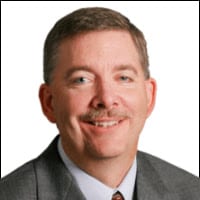
Mike Griswold serves as Vice President Analyst with Gartner’s Consumer Value Chain team, focusing on the retail supply chain. He is responsible for assisting supply leaders in understanding and implementing demand-driven supply chain principles that improve the performance of their supply chain. Mr. Griswold joined Gartner through the company’s acquisition of AMR. Previous roles include helping line-of-business users align corporate strategy with their supply chain process and technology initiatives. One recent study published by a team of Gartner analysts, including Mike Griswold is Retail Supply Chain Outlook 2019: Elevating the Consumer’s Shopping Experience. Mr. Griswold holds a BS in Business Management from Canisius College and an MBA from the Whittemore School of Business & Economics at the University of New Hampshire. Learn more about Gartner here: www.gartner.com
